
COACH ROY KIDD SPECIAL EDITION
A PUBLICATION FOR ALUMNI AND FRIENDS OF EASTERN KENTUCKY UNIVERSITY
Contributors
EKU Magazine is a collaborative effort between EKU Alumni Engagement and EKU Communications and Brand Management.
EKU President
David T. McFaddin, ’99 ’15
Vice President for Development and Alumni Engagement
Betina Gardner
Chief of Staff/Chief Communications Officer
Colleen Chaney, ’18
Alumni Engagement Staff
Associate Vice President of Development and Alumni Engagement
Dan McBride, ’89
Senior Director for Engagement and Communications
Steve Greenwell, ’06
Assistant Director of Engagement and Communications
Alex Hanavan, ’15 ’17
Coordinator of Alumni Programming and Student Philanthropy
Ashley Turner, ’19 ’21
Administrative Assistant II, Alumni Engagement

Jessica Duerson
Content
EKU Archives
Wayne Bowlin
Dr. James Coy III
Dr. Hayward Skip Daugherty
Dan McBride
Steve McClain
Karl Park
Greg Stotelmyer
Writers
Jack Frost
Marc Kidd
Jack Lengyel
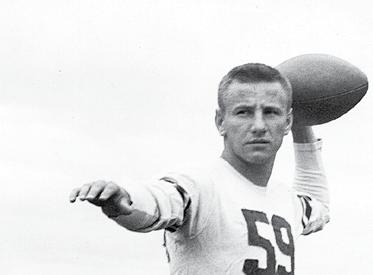
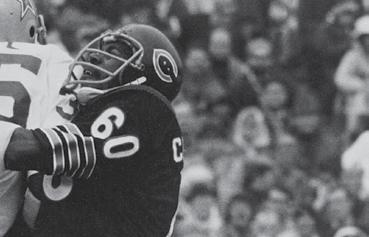
Steve McClain
Karl Park
Marla Ridenour
Greg Stotelmyer
Keith Taylor
Jerry Wallace
Tim Webb
Doug Whitlock
Photography
Mark Cornelison
Greg Perry
Tim Webb
Akron Beacon Journal
The Tennessean
WKU
EKU Archives
Design Consultation
Mickey Thomas
Design and Layout
Paul Blodgett
Eastern Kentucky University
521 Lancaster Ave. Richmond, KY 40475-3102
eku.edu
Visit us online: ekusports.com stories.eku.edu alumni.eku.edu development.eku.edu
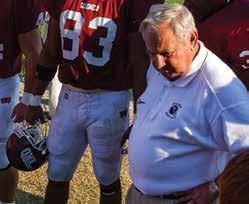
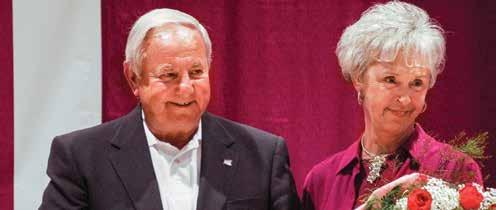
Eastern Kentucky University is an Equal Opportunity/Affirmative Action employer and educational institution and does not discriminate on the basis of age (40 and over), race, color, religion, sex, sexual orientation, gender identity, gender expression, pregnancy, ethnicity, disability, national origin, veteran status or genetic information in the admission to, or participation in, any educational program or activity (e.g., athletics, academics and housing) which it conducts, or in any employment policy or practice. Any complaint arising by reason of alleged discrimination should be directed to the Office of Equity and Inclusion, Eastern Kentucky University, Jones Building 416, Richmond, Kentucky 40475, (859) 622-8020, or the U.S. Department of Education, Office for Civil Rights, 400 Maryland Avenue, SW, Washington, D.C. 20202, 1 (800) 421-3481 (V), 1 (800) 877-8339 (TTY).
EKU has taken considerable precautions to keep students, faculty and staff healthy and safe during the coronavirus pandemic. All photos were either taken pre-pandemic or in an environment designed to ensure the safety of all participants.
PHOTO BY DANIEL FRANK. PEXELS.COM
5 Foundations For Success 8 Grantland Rice Bowl 14 A View From The Booth 16 The Game Coach Kidd’s Favorite Victory 18 Adversary To Admirer 24 Newspaper Nostalgia 28 The Glory Years 35 Chasing 300 38 Presidential Perspectives 40 Newspaper Nostalgia Father, Friend, Faithful SPECIAL EDITION CONTENTS 44 32 21 2 Every Story Has Its Start 11
A Reporter Gets Her Start More Than Just Winning Football Games The Colonel Line In The NFL The Greatest Teammate
DESTINED FOR GREATNESS
Dear Friends:
Before I arrived at Eastern Kentucky University in 2002 to serve as interim athletics director, I only knew Coach Roy Kidd by reputation –– and what a lofty stature it was. Then, as I watched Coach Kidd go about his job and observed his inner fire, attention to detail and interactions with players, it became clear why he is one of college football’s most successful and revered coaches of all time. And as my wife, Sandy, and I got to know Coach Kidd and his bride, Sue, on a personal level, the closer friends we became and the better I came to understand why both are so treasured on campus and throughout the community.
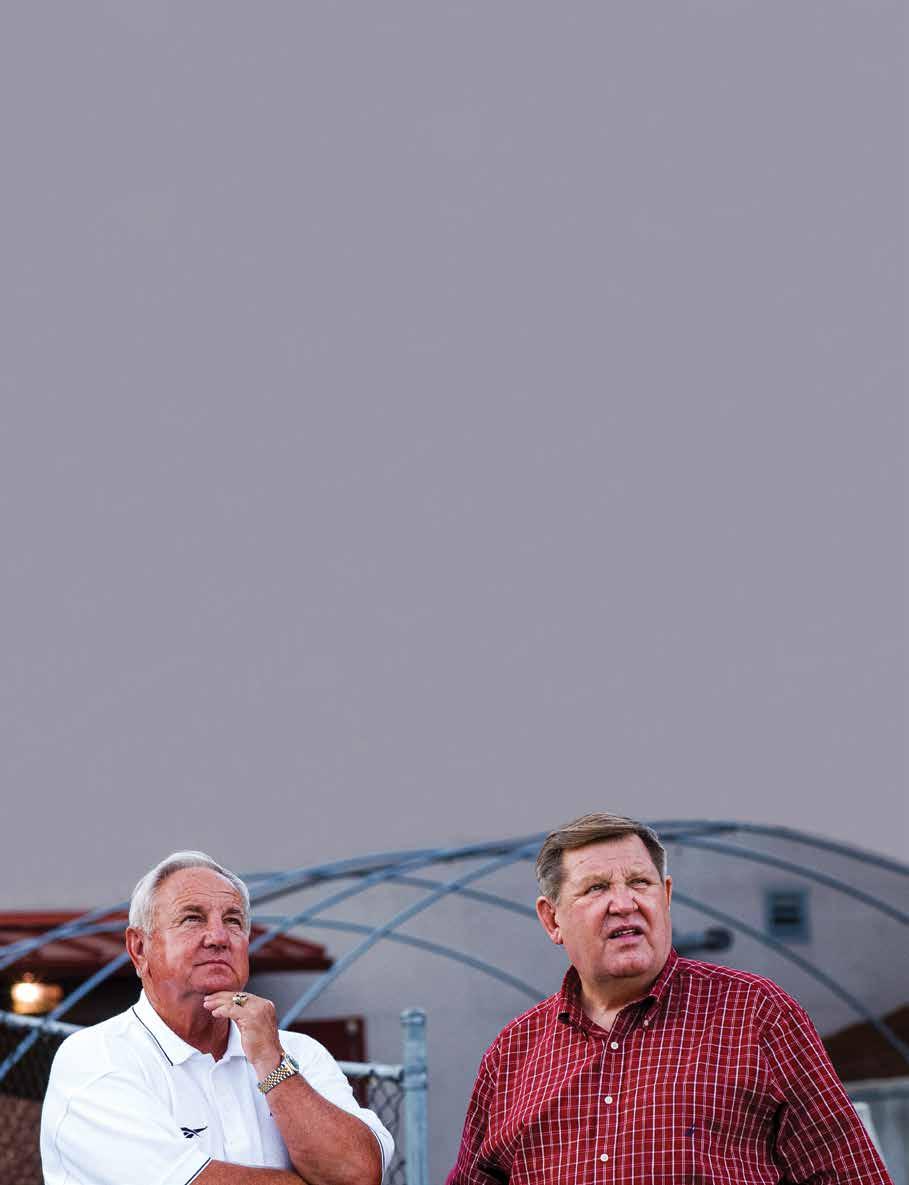
At every step in Coach Kidd’s life, he exemplified honor, commitment, competitiveness, discipline, leadership, perseverance, humility and loyalty, beginning with his days as a three-sport high school star in his native Corbin, continuing through his time as a “Little All-American” quarterback and baseball standout at Eastern and culminating with his consummate 39-year streak of excellence as head football coach for the Colonels. His record validates the personal qualities of someone who was destined for greatness.
But the 314 career wins, 37 nonlosing seasons, two I-AA national championships, 16 conference titles, membership in the College Football Hall of Fame, the 2023 Amos Alonzo Stagg Award and countless other achievements and honors can’t begin to measure the impact Coach Kidd had on his players and staff, the coaching profession, his beloved alma mater and community.
DESPITE ALL HIS SUCCESS, COACH KIDD WAS ALWAYS QUICK TO CREDIT OTHERS, AND THIS PUBLICATION WILL SHARE SOME PERSONAL STORIES FROM THOSE WHO KNOW HIM BEST –– CHILDHOOD FRIENDS IN CORBIN, A PLAYER ON THE FIRST HIGH SCHOOL TEAM HE COACHED, A PIONEERING FEMALE SPORTS REPORTER, THE ANNOUNCER FOR MANY OF HIS MILESTONE ACHIEVEMENTS, COACHING ADVERSARIES, FORMER COLONEL PLAYERS, A FORMER PASTOR, ACADEMIC LEADERS, FAMILY MEMBERS AND OTHERS.
Coach Kidd announced his retirement and coached his final game during my short tenure at Eastern, but it was only the beginning of a great friendship between our families. Sandy and I fondly recall the long bus rides to away games, where we swapped countless stories with Roy and Sue, as well as many visits to the Kidds’ home, watching football games in the comfort of their living room. To this day, we are honored and blessed to count the Kidds among our dearest friends. They are richly deserving of this tribute, and we hope this publication puts into focus why they mean so much to the Colonel family.
Sincerely with all our love,
EKU MAGAZINE 1
Jack and Sandy Lengyel
Coach Kidd and Jack Lengyel before the Oregon State game in 2002.
Jack and Sandy Lengyel
by Keith Taylor

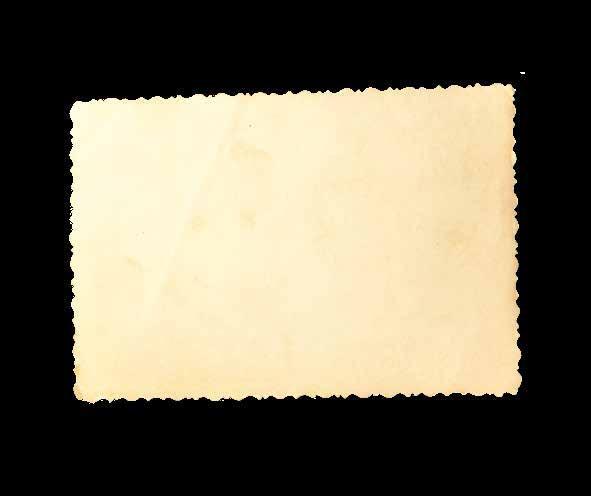

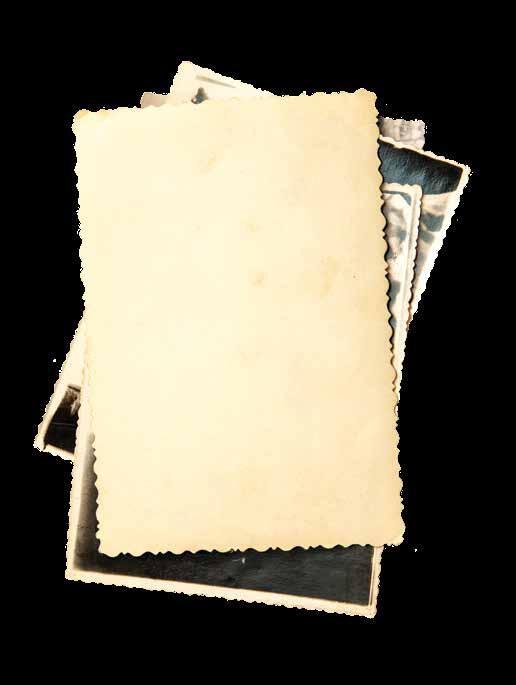

Roy Kidd has a street named after him in Corbin, the town where the legendary player and coach began a playing career that ultimately led him to Eastern Kentucky University.
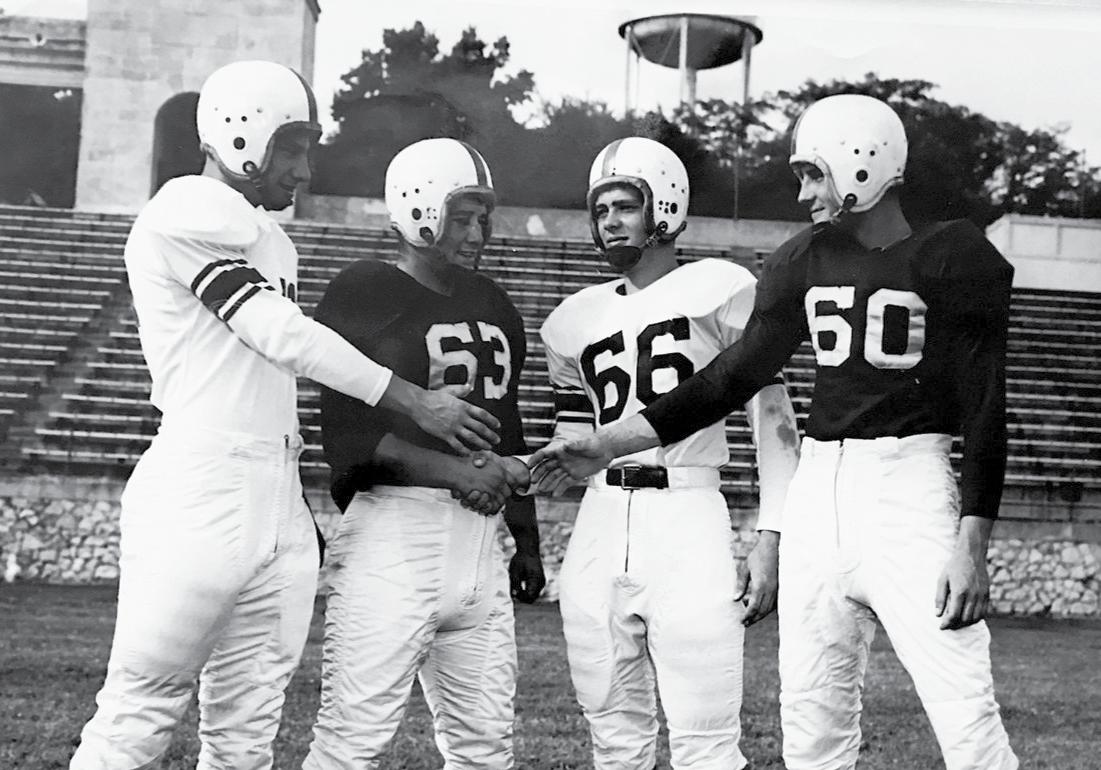
2 SPECIAL EDITION
the district finals to give Corbin a dramatic win over London.
“It didn’t surprise us,” Kidd’s friend, the late Bob Terrell, said in an interview in 2001. “We celebrated and all that, but we always felt like we had a chance as long as Roy was up (at the plate).”
He also played basketball and produced some memorable moments throughout his prep career. During his final year, Kidd connected on a halfcourt game-winning shot in a consolation game that gave the Redhounds a third-place finish in the state tournament. As a senior, he collected three steals in the final minute and scored five points in a 47-44 win over Manchester.

Despite his success in other sports, his mainstay was football, where he was an all-state performer as a halfback. In addition






to his running skills, Kidd threw five touchdowns in his final game at Corbin as a halfback. During his senior year, Kidd’s teams in all sports finished with a record of 56-6-1.
“He just had that leadership ability,” Terrell said. “He always kept his poise in the most crucial of times.
You never had to worry about him losing control emotionally
Although Kidd made his mark in football, he could have been successful if he had chosen a different path than the one that led him to the gridiron. “He has great character, a lot of integrity and leadership,” Terrell said at the time. “Roy has a will to win; he’s a true competitor, and he would never give up. I think Roy could have been as successful as a basketball coach or baseball coach.”
EKU MAGAZINE 3
PREVIOUS PAGE: Roy Kidd (left) as co-captain for the 1950 Kentucky East All-Stars, and school photo. AT LEFT: The southpaw Roy Kidd as an Eastern freshman. ABOVE: Roy Kidd as a member (front row, far left) of the 1948-49 Corbin Greyhound basketball team.
Although Kidd was a successful college coach who guided the Colonels to a pair of national titles, all the success never changed him, and he stayed humble and true to his upbringing. “Roy is a very successful person that has still stayed with the values he had growing up,” Terrell said. “He is still the same solid person. Success hasn’t affected him with his ego.”
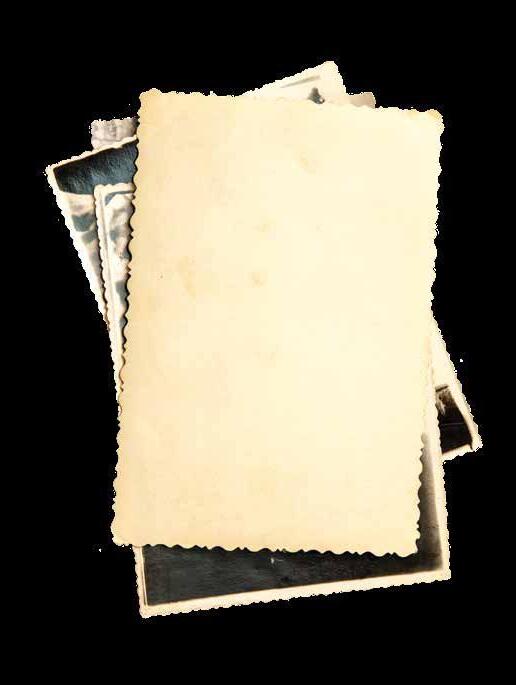
Even after his playing days and well into his storied coaching career at Eastern, Kidd always remembered his Corbin roots. “Every time we had a meeting where we needed him to be there, raising money or ground-breaking ceremonies, Roy was
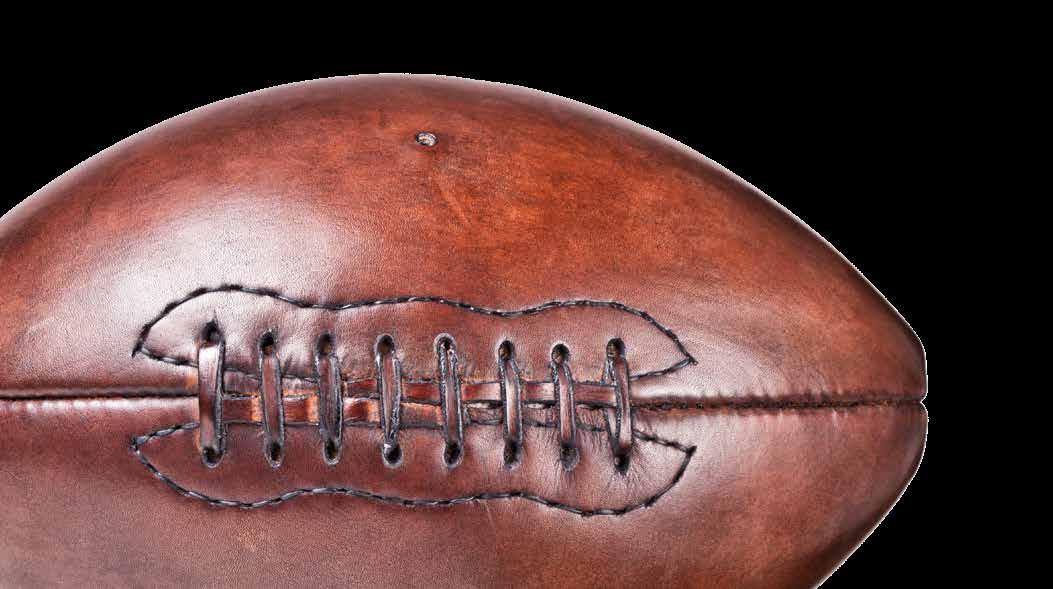


always here,” Terrell said. “He always made himself accessible whenever we had something special going on. He was always here to participate.”
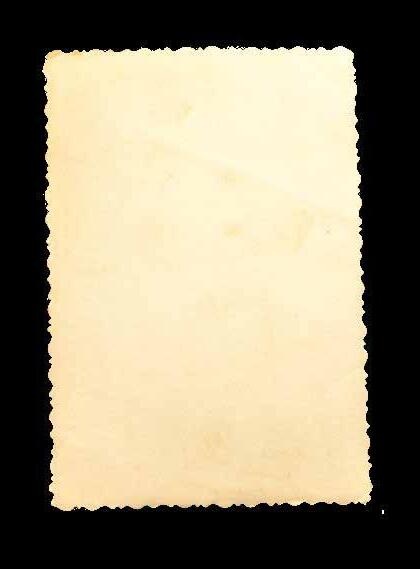

True to the game, true to his university and true to his hometown, despite all the national acclaim. That’s the essence of Coach Kidd. n


4 SPECIAL EDITION
FOUNDATIONS FOR
by Jerry Wallace
Who could have predicted that the 1956 Madison-Model football team would go on to win its conference and remain unbeaten until a “bowl game” loss in its season finale?

After all, its new coach took over just six days before the team’s first practice. The program, which had recorded only 23 victories over its previous nine seasons, was in its first year of racial integration. Only 13 players –– 11 seniors and two juniors –– would see significant playing time, and only one of those weighed 200-plus pounds.
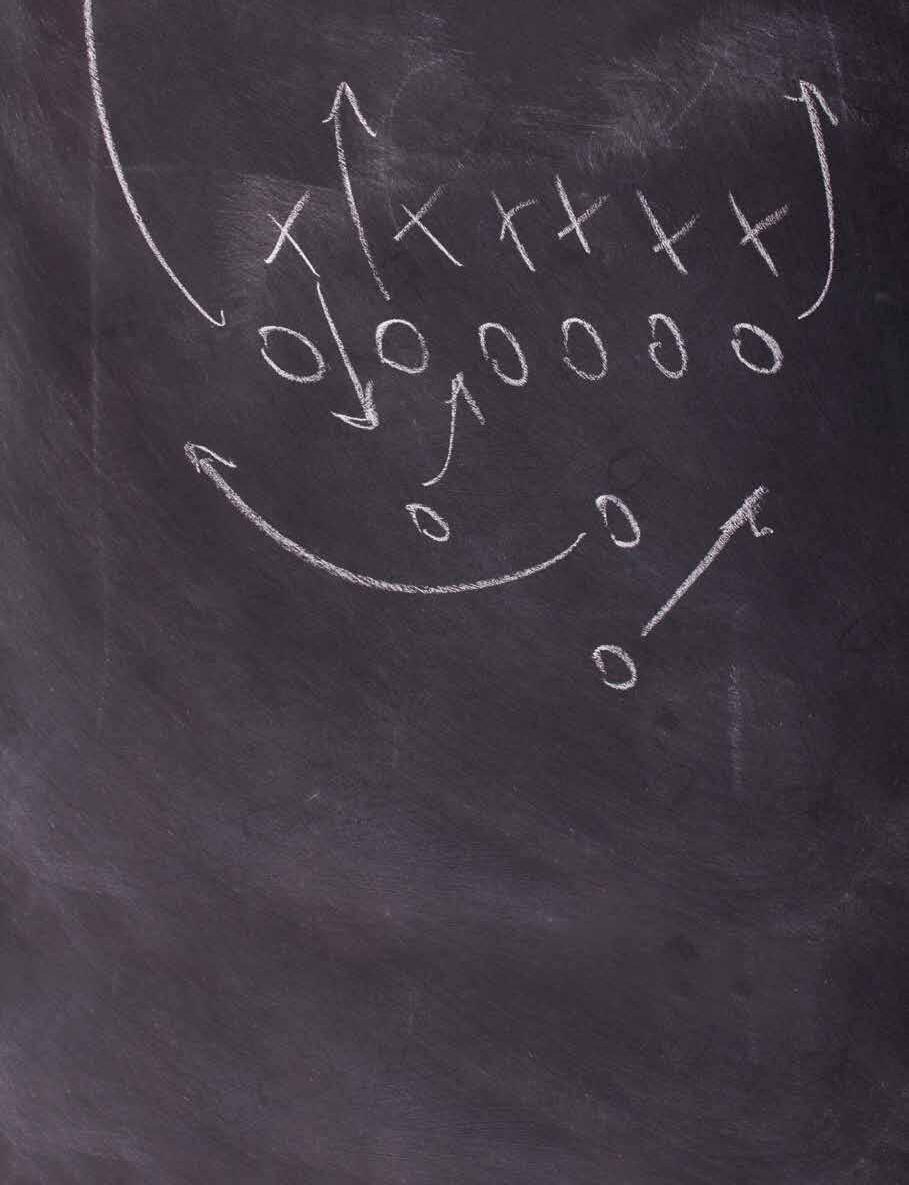
EKU MAGAZINE 5
MADISON-MODEL ROYAL PURPLES
Treat others as you would want to be treated
Be honest and sincere Choose your friends and associates carefully
Give every task your full effort
Be able to listen –– every person knows something you don’t

Pay attention to the little things
Be mentally tough –– learn to get up when you’ve been knocked down
Know your opponent’s strengths and weaknesses as well as your own


If you practice hard, you will play hard
But then, this was no ordinary group of young men, and it was certainly no ordinary coach who led the Royal Purples into battle. Roy Kidd, just 24 at the time, had never known anything but success as a three-sport high school star in his native Corbin and as a standout quarterback at Eastern, and he quickly built a winning culture with Madison-Model by modeling a combination of competitive fire, hard work, steely discipline, intense preparation, painstaking attention to detail and, of course, some x-and-o wizardry –– all the traits that would later make him a College Football Hall of Fame coach.
The ’56 team was anchored by seniors Jimmy Hinkle, quarterback; Johnny Greene, Charles Harkleroad and Allen Hughes (son of Eastern coaching legend “Turkey” Hughes), backfield; Harold Lane, J. I. Isbell, Ernest Aldridge, Cecil Curry, Fred Crump, Ralph Azbill and Richard Elam.
Lineman Wayne Bowlin was one of the two juniors on the MadisonModel squad, joining Sam Chambers, the first African American to play and start for the newly integrated program, which combined players from Richmond Madison and Model Laboratory high schools. The two went on to co-captain the ’57 squad, which also lost only one game. The race-related issues some expected never materialized. “The year went as smooth as silk,” Bowlin recalled, adding that Kidd “treated us all the same.”
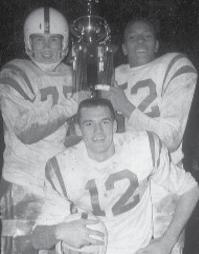
Love your parents or guardians, or whomever is responsible for any success you achieve, and let them know it
6 SPECIAL EDITION
Kidd commanded the respect of his players from day one. “When he walked into a room, he didn’t have to say a word,” Bowlin recalled. It was all business on the football field, though Kidd did bring in a jukebox to help loosen the players before practices and games. Curfew was strictly enforced, and the players were required to wear a tie to games and attend church. “He always felt if you looked sloppy, you’d play sloppy.”
Kidd’s Madison-Model teams amassed a 54-11-1 record in his six years at the helm, with his final team in 1961 finishing 13-1 as Kentucky Class AA runner-up. Kidd was consequently named Kentucky High School Coach of the Year and three years later began his historic run with the Colonels.


Bowlin, whom Kidd helped earn a scholarship to Eastern, went on to a distinguished career as a coach and educator, retiring in 1993 after 20 years as principal at Daniel Boone Elementary School in Richmond. His son, Mike, went on to play for Kidd at Eastern and has served as head football coach at East Jessamine High School since 2005.

A few years into his own professional career, Bowlin found himself on a recruiting trip with Kidd, by that time head coach at Eastern. This would be the perfect time, Bowlin thought, to thank his former mentor for all he had done to spur his own success. He struggled to find the right words but never forgot Kidd’s response: “Don’t thank me. Just go help somebody else.”
So, just as he had done so many times on the football field, Bowlin heeded that play call, recalling how he viewed his Daniel Boone students as “little Wayne Bowlins” who needed his support and encouragement.

Of course, Kidd offered the same counsel to countless others, and it’s why his legacy lives on far beyond the confines of football, the stadium that bears his name and the years he coached young men to be the best they could be and then make a difference in the lives of others. n
PREVIOUS PAGE: Co-captains Wayne Bowlin, left, and Sam Chambers hold the Recreation Bowl championship trophy, with MVP Jerry Woolum kneeling in front. THIS PAGE: above left, Wayne Bowlin; above right, Coach Kidd; and, at left, starting lineup, back row, from left, Jerry Walker, Bill Putteet, Jerry Woolum, Orville Abner, Allen McCracken and Pearl Cowan; front, from left, Ed Klatte, Shirley Smith, Sam Chambers, Richard Elam and Wayne Bowlin.

EKU MAGAZINE 7
Bowlin was the youngest of 1O children and the first in his family to finish high school, a feat he attributes to his gridiron mentor. “I wouldn’t have graduated either if I hadn’t met Coach Kidd,” Bowlin said. “I’ve had a super life, and I owe it all to Coach.”
GRANTLAND RICE
by Karl Park
There have been many successful years of Eastern Kentucky football, but a few truly stand out as memorable and historic seasons.
Hall of Fame coach Roy Kidd took over an EKU program in the 1960s in need of a spark. In just his fourth season at the helm, the Colonels won the 1967 NCAA Mideast Region championship. A decade later, Kidd led Eastern to four straight national championship game appearances, with bookend titles in 1979 and 1982. In those four years, Eastern compiled a 46-7 record and was continually ranked No. 1 in the nation, finishing at the top spot in the country in both the 1981 and 1982 seasons.
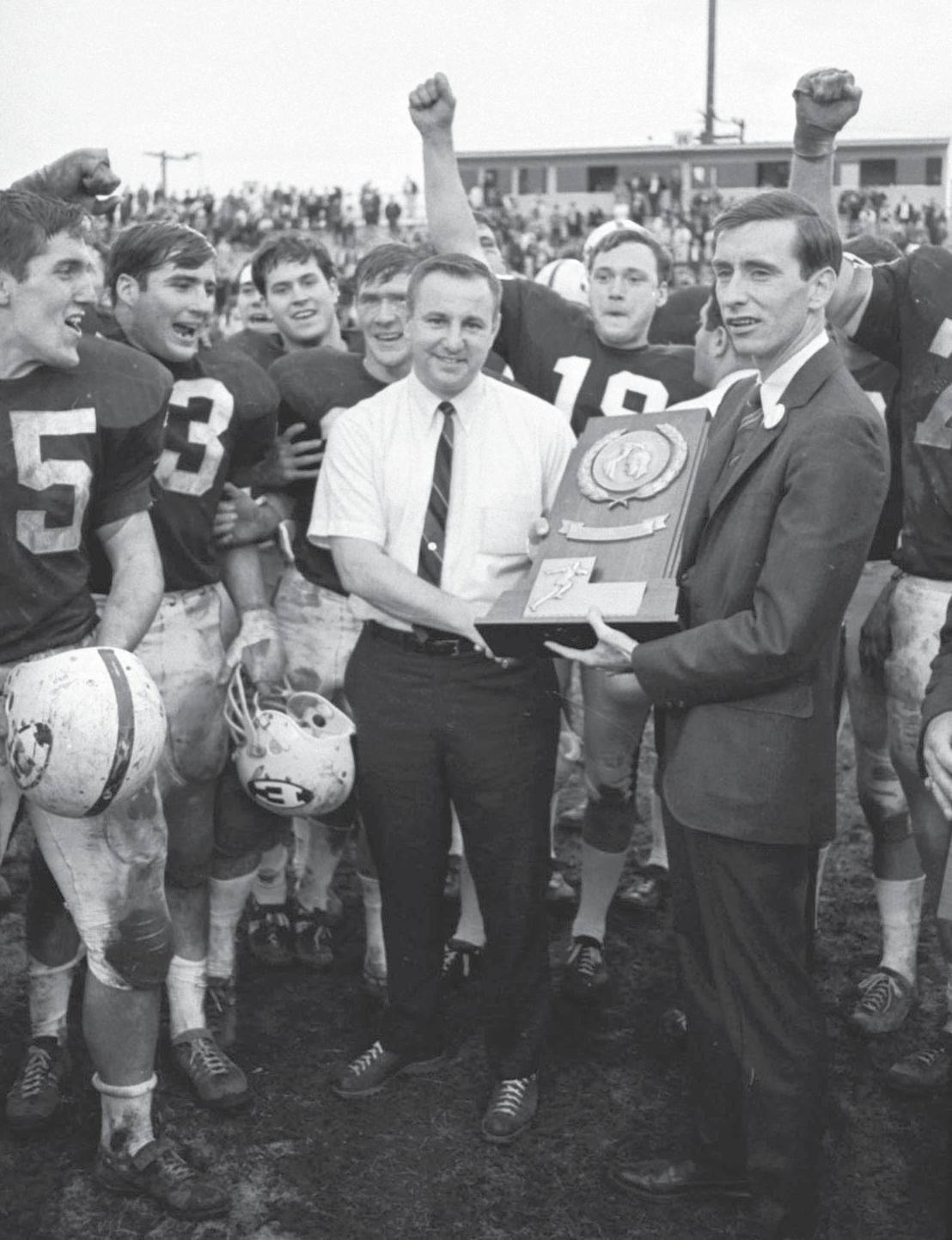
8 SPECIAL EDITION
BOWL
Those championship seasons also set in motion a string of 17 Division I FCS playoff appearances during the next 19 seasons for the Colonels that three times –– 1986, 1988 and 1991 –– ended just short of national title games with close semifinal round losses.
1967 MIDEAST REGION CHAMPIONS
In the 10 years prior to 1967, Eastern Kentucky managed only two winning seasons. However, Coach Kidd and the Colonels tallied a respectable 7-3 record in 1966, setting the stage for the first EKU championship team. “This team got the championship tradition started at Eastern,” said Kidd, who coached the Colonels to 314 victories in 39 years, won 16 OVC titles and two national I-AA crowns and was inducted into the College Football Hall of Fame in 2003. “They have always been and will always be one of my favorite teams.”

Things started out on a sour note that season when the Colonels opened their 10-game schedule with a 16-0 loss to a tough University of Dayton team on the road in a contest that saw EKU held to just 34 yards rushing, while the Flyers piled up 231 yards on the ground.
This was the last game that the Colonels would lose that year.
“The success for this program really began with the groups ahead of us. Guys like (quarterback)
Larry Marmie and (middle guard) Ron DaVingo ... we learned a lot from them. Coach Kidd had the vision, and we all bought into it.”
- Jim Guice, Grantland Rice Bowl MVP


The second game of the year was a 35-7 decision for the Colonels over OVC rival East Tennessee that produced the emergence of freshman tailback Jack McCoy. He finished
the game with 74 yards rushing and two touchdowns.


Sophomore quarterback Tim Speaks, subbing for an injured Jim Guice, directed the Colonels to a 37-0 win over Austin Peay in the third game. The EKU defensive unit, known as the Headhunters, lived up to their moniker by shutting out the Bucs as tricaptain Chuck Siemon and all-conference linebacker Ron Reed combined for 16 tackles and 20 assists in the win.
Eastern’s quality depth at quarterback again proved to be too much for opponent number four that season as Speaks started at signal-caller for the Colonels, while first team All-OVC and AllAmerican candidate Guice was used in passing situations only, as Eastern edged Middle Tennessee 14-7. Eastern’s last nonconference game came the following week when 15 records fell for the Colonels in a 55-0 trouncing of Northwood (Mich.) College. Guice was 17-of-30 for 260 yards and four touchdown tosses.
The stage was set for the game of the year with who else but cross-state rival Western Kentucky, visiting EKU for what would turn out to be its last appearance at the antiquated Hanger Stadium in the middle of campus.
Every seat in the stadium was filled, and many spectators stood on the hillside in the east end zone to form the record-setting 15,000 crowd in attendance that sunny Saturday afternoon.
One of the most memorable goal-line stands in Eastern history occurred in this game as the Headhunters stopped Western’s All-American tailback Dickie Moore six out of seven times from just outside the one-yard line before Moore finally punched it in on the eighth try for a touchdown.



EKU MAGAZINE 9
HARRY LENZ SAFETY EKU
American Football BACKGROUND American Football CKGROUND EKU AARON
American Football BACKGROUND American Football GROUND EKU
JIM GUICE QUARTERBACK
MARSH RECEIVER
American Football BA GROUND American Football BACKGROUND EKU
TED GREEN DEFENSIVE BACK
PREVIOUS PAGE: Left to right with Coach Kidd for the championship plaque presentation; Bill Brewer, Ron House, Ted Holcomb, Harry Lenz and Bob Plotts.
Eastern countered that score when fullback Bob Beck’s 10-yard touchdown run was followed by Guice’s two-point conversion run for the tying points, 14-14. A late would-be gamewinning touchdown pass from Guice to Don Buehler was overthrown by inches as the game ended in a tie.
Three more easy victories and a tie with Morehead State in the regular season finale left Eastern with a 7-1-2 record. The Colonels were then chosen to make the University’s second bowl appearance against Indiana Collegiate Conference champion Ball State University in the Grantland Rice Bowl in Murfreesboro, Tennessee. The bowl game would decide the NCAA Mideast Regional Championship, which encompassed 10 states and 100 teams, one of four such college division championships set up by the NCAA that year.
Eastern went into the game shorthanded as the NCAA would not allow freshmen to play, which kept running backs McCoy and fullback Butch Evans on the sidelines. Kidd countered that ruling by moving All-American receiver Aaron Marsh to tailback. This move paid off as Marsh made a huge contribution in the first half, picking up 46 yards on the ground, grabbing three passes and totaling 39 yards on two punt returns before being forced from the game with a back injury.
After the Colonels led 13-7 at the break, it was time for one of the biggest plays in Colonel football history when AllAmerican nose guard Teddy Taylor burst through the line, stole the ball from Cardinal quarterback Doc Heath and ran 39 yards for a score that put Eastern up 20-7.
Ball State, ranked fifth in the nation heading into the Grantland Rice Bowl, responded by reaching EKU’s nineyard-line before the Colonel defense stiffened and stopped the Cardinals’ drive. The next few minutes
were vintage Guice. He sliced and diced the Ball State defense, hitting six straight passes for 64 of the 91 yards in the drive, and culminated the back-breaking sequence of events with a 28-yard scoring pass to Ted Holcomb that provided the Colonels with an insurmountable 27-7 lead.
In the jubilant EKU locker room following the 27-13 victory over Ball State, the tri-captains for the ‘67 Colonels –– Harry Lenz, Siemon and Marsh –– presented the game ball to their elated coach, Roy Kidd, signifying his first championship season at Eastern.
“Coach, you are the best coach in the OVC, the Mideast Region and anywhere else that anybody plays football,” Lenz said.
In addition to Guice, Marsh and Holcomb’s heroics and the overall play of the Headhunters in the Bowl victory, John Tazel concluded his fabulous EKU career with a remarkable performance that included 11 pass receptions for 127 yards and a touchdown.
“Ball State was a very good team,” Kidd said. “The thing that bothered me the most was their size. They were not only one of the biggest but also one of the quickest teams we had ever faced.”
Guice, named MVP of the game, set a Grantland Rice Bowl record for passing percentage (15-of-19, .788), throwing for 136 yards and two scores.

“When you talk about what got it all started for the tremendous success this program has enjoyed for the past 40 years, you have to start here with this 1967 Eastern team,” former EKU head football coach Danny Hope said. n

10 SPECIAL EDITION
MORE THAN JUST WINNING FOOTBALL GAMES
by Steve McClain
While it is true that a coach is measured by wins and losses, players also appraise a coach in other ways –– namely, how they prepare them for life after sport.
And for many former Colonel football players, Coach Roy Kidd succeeded by all measuring sticks.
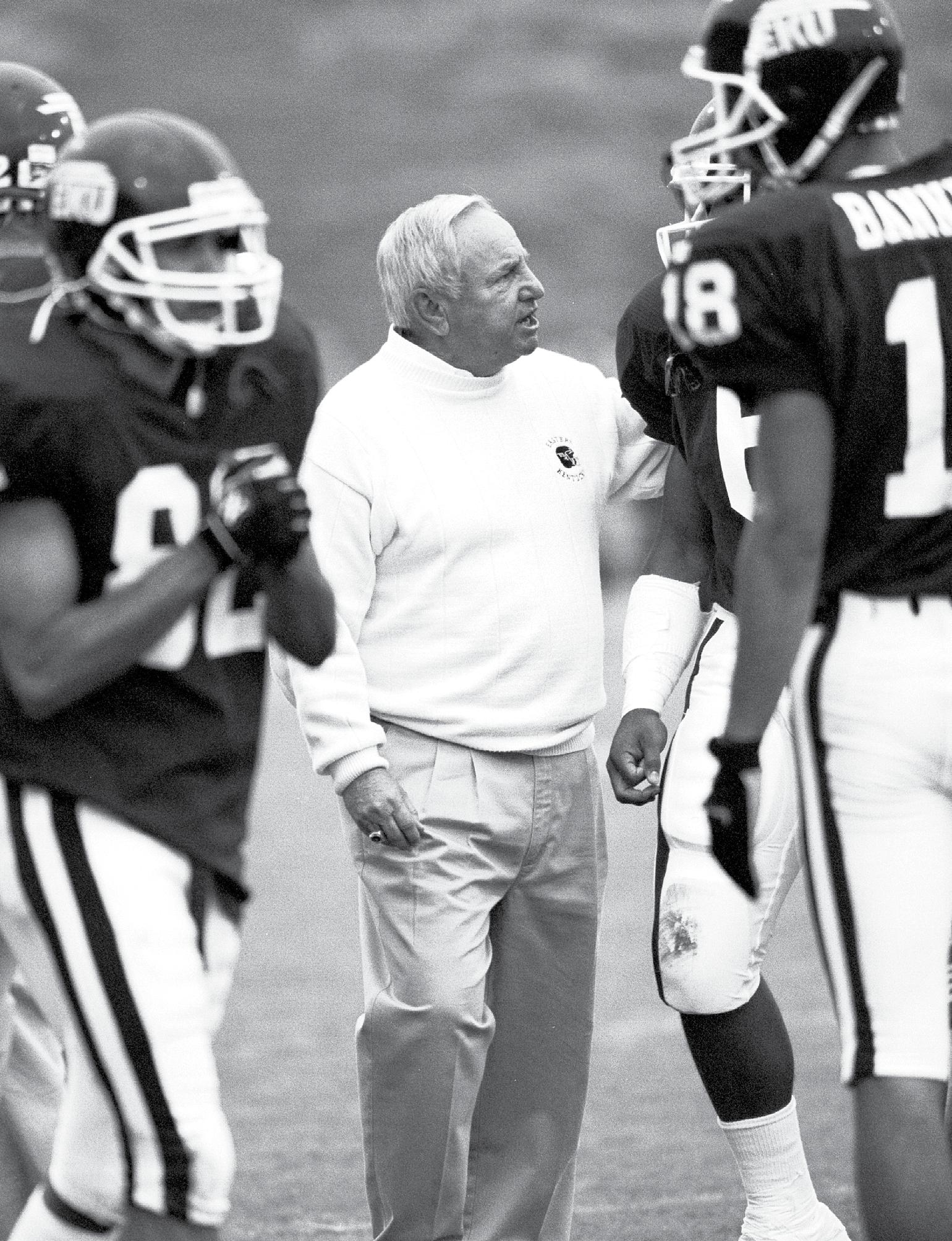
EKU MAGAZINE 11
Alvin Miller and Doug Hampton both experienced success on the field under Kidd, but they also had success after leaving EKU and said the legendary EKU coach had a hand in their growth.


“He was like a father, and I didn’t have a father in the house, and I didn’t have the boundaries others had,” said Miller, who played 1977-80 and was MVP in the 1979 National Championship game. “I was kind of wild when I came to Eastern, and Coach Kidd said, ‘You will have to change your direction.’ He was very structured and wanted things done his way, and if you didn’t, you better have a good reason. At the same time, he was very reasonable and compassionate.”
When Miller came to Richmond from Florida, the running back weighed 180 pounds before beefing up to 215.
“Nobody wanted to give me a chance. And I realized that if I had stayed in Florida, I would have been in some kind of trouble,” he said, adding that a couple of friends ended up on death row. “I was looking to get out. I had to get out (of Florida).”
Hampton came to EKU from Evarts High School in eastern Kentucky and played on the 1967 Grantland Rice Bowl championship team.
“I was in class one day and got a call that a coach from Eastern was there to see me. It was Coach Kidd,” said Hampton.
“He said, ‘We think you could play for us.’ I asked when they would know if they had a scholarship for me, and he said they had one in the car. My dad was a coal miner, and I said, ‘Let me call my dad.’ I told him what was going on and said he was home, and we sat in the living room, and that’s how I chose Eastern.”
In his sophomore season, though, Hampton ruptured a disk in his neck and never played again, but Kidd said they would
12 SPECIAL EDITION
“HE WAS LIKE A FATHER, AND I DIDN’T HAVE A FATHER IN THE HOUSE.”
–––ALVIN MILLER
honor his scholarship and made him a student assistant coach for wide receivers and then tight ends.

“I sat in on a lot of coaches’ meetings. He was like a judge. He would let assistant coaches argue their strategy or who should start and make their case, and then he he would make his decision. When he made his decision, everybody went to the practice field 100 percent behind that decision. No waffling,” Hampton said.
“When I hear Coach (Nick) Saban talk about responsibility and accountability, Coach Kidd was ahead of them. Whatever your role was, he held you accountable. I remember him saying, ‘I don’t want to coach coaches. I want people to know what they are doing.’ He wanted to win, and that went through the team.”
Hampton has had a long history with EKU. He met his wife of 54 years, Patsy, in the EKU grill. His daughter, Sherri Beth, went there; his son, Brent, played for Kidd; and his grandson, Clay, was an assistant coach at EKU in 2021.

“My dad told Coach Kidd, sitting in my living room, to treat me like I was his boy. When Brent went to Eastern to play, I told Coach Kidd, ‘Treat him like he was your boy,’” Hampton said.
Kidd left an indelible impression on countless other players, along with many fond memories. Miller, who went into the military as a chaplain for more than 32 years and is now a bishop with his church, could not praise his former mentor enough.
“He means the world to me,” Miller said. “He’s a hero to me. I love the man for what he did for me. He saved my life.” n
EKU MAGAZINE 13
“I ASKED WHEN THEY WOULD KNOW IF THEY HAD A SCHOLARSHIP FOR ME, AND HE SAID THEY HAD ONE IN THE CAR.” –––DOUG HAMPTON
OPENING PAGE: Nick Towns (left) and Alex Bannister with Coach Kidd. Coach Kidd with Jeff McCarthy (top), and at a reunion years later with Doug Hampton.
FROM THE BOOTH VIEW A

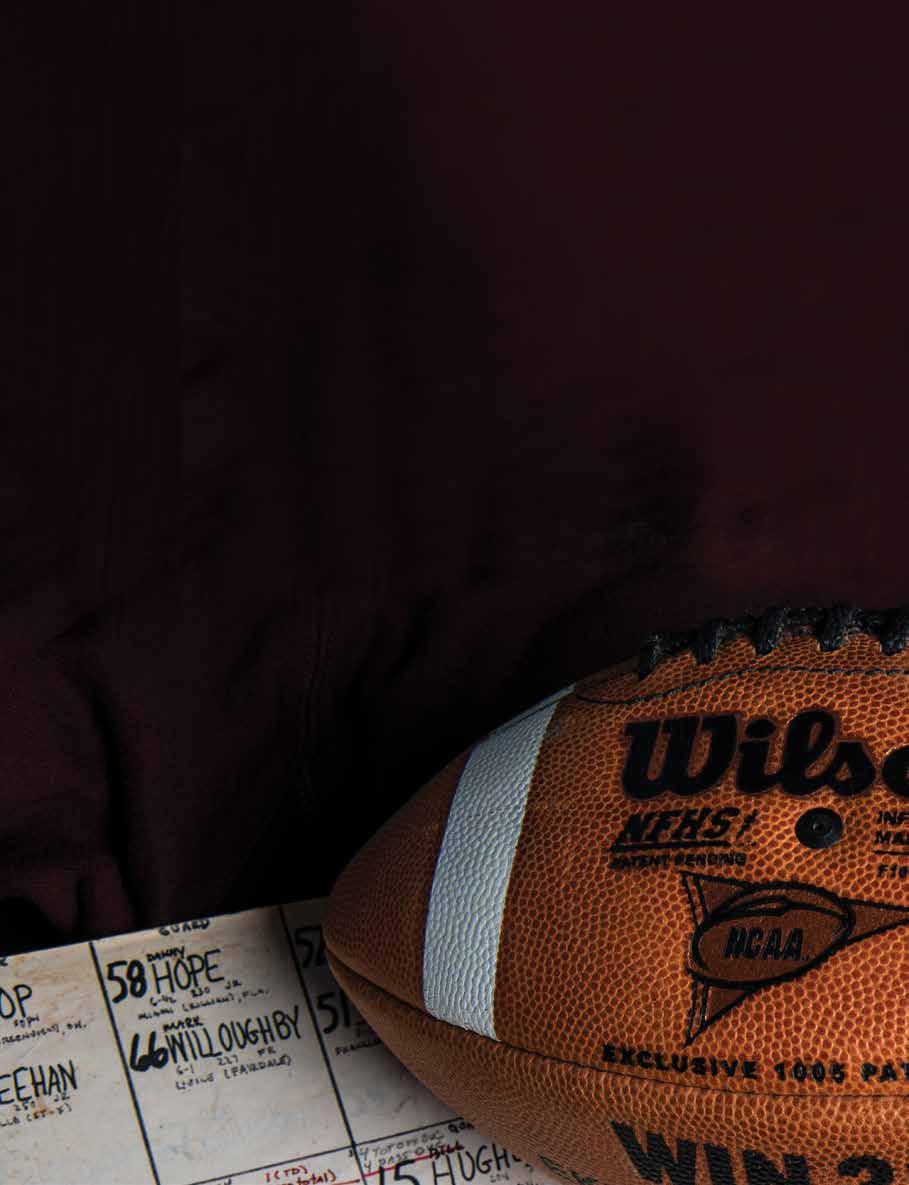 by Greg Stotelmyer
by Greg Stotelmyer

14 SPECIAL EDITION
“Greg, thanks for all the memories.”
Coach Roy Kidd
Late on a Sunday morning 20 years ago (November 22, 2002), Coach and I finished taping our last Roy Kidd Show. As we walked off the set in a Lexington TV studio, he said, “I want to take you to lunch.”

Most Sundays, he was rushing back to the office to get ready for the next game. But on that Sunday, we both wanted to linger and to reminisce. He took me to Waffle House. That’s Coach Kidd. Sincere, down to earth and a true legend.
The day before, in Nashville’s NFL stadium, he had won his 314th and final football game as EKU’s head coach. An era had ended, but not the memories. A few weeks later, he sent me a game ball from the 45-20 win over Tennessee State. On one of the ball’s white stripes, he had hand-printed, “Greg, thanks for all the memories. Coach Roy Kidd.”
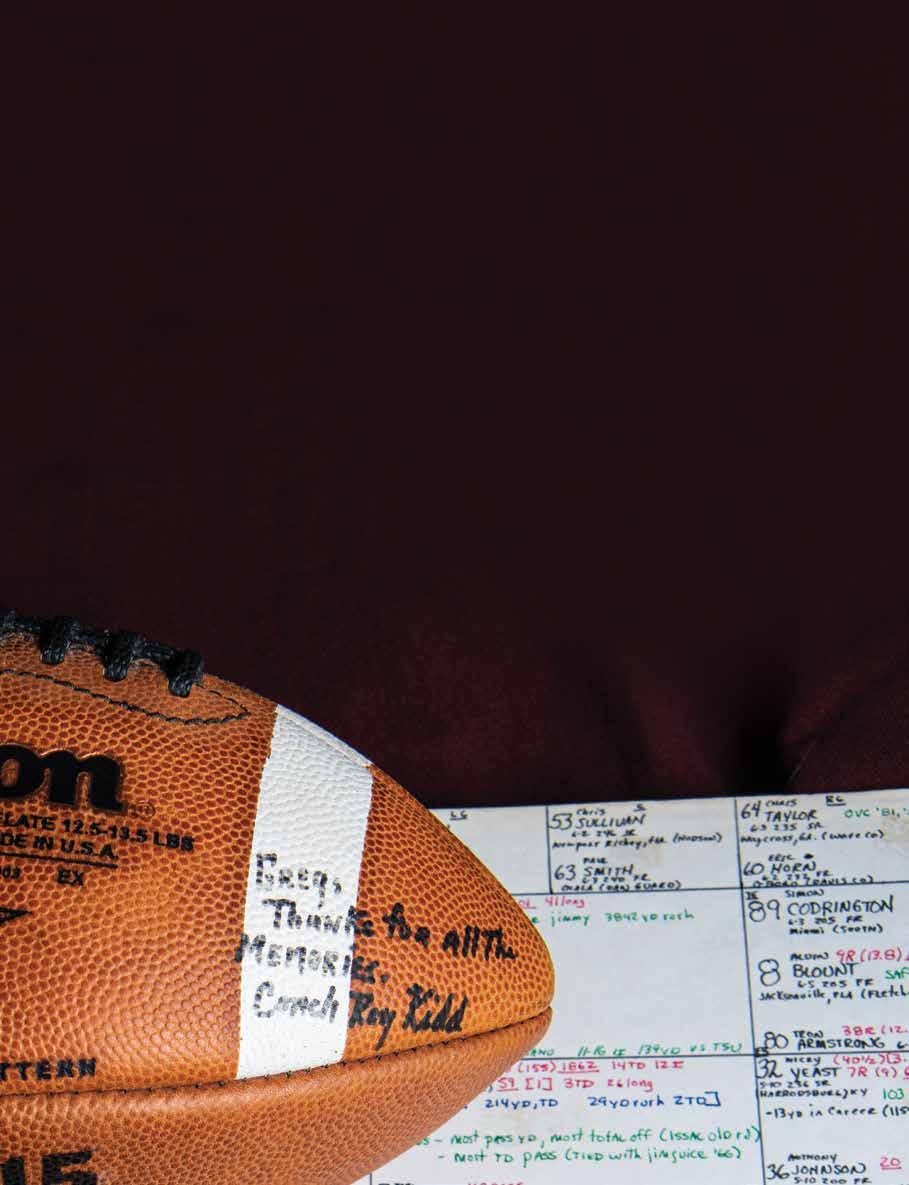
To this day, that ball sits on a bookshelf near the desk where I continue to prepare for broadcasts of Colonel games. It’s a constant reminder of how grateful I am to have been a tiny part of his last 24 seasons.
Coach won 100 games before I arrived in Richmond (including two against the college where I was a student at the time.) Honestly, I have no idea how or when he found out that Eastern Kentucky University’s new playby-play announcer was a Western Kentucky University graduate.
I’m not sure we ever tackled that subject, but Coach’s wife, Sue, still remembers telling me in a motherly yet stern way: “Don’t forget who you work for. You work for Eastern.”
No worries, Sue. I have bled Maroon since before my first Colonel broadcast September 8, 1979, just 16 months after I graduated from that other school.
Good luck charm, perhaps? EKU did play in the 1-AA National Championship game my first four years in Richmond, winning two titles. But, no, I’m the lucky one, humbled to have had so many memories, up close and personal, thanks to a legendary coach.
 That’s my “Matter of Pride.”
Coach Kidd speaks with long-time Colonel announcer Greg Stotelmyer after his famous 300th victory.
by Karl Park
That’s my “Matter of Pride.”
Coach Kidd speaks with long-time Colonel announcer Greg Stotelmyer after his famous 300th victory.
by Karl Park
NOTRE DAME-SOUTHERN CAL … MICHIGAN-OHIO STATE … TEXAS-OKLAHOMA … ALABAMA-AUBURN … EASTERN KENTUCKY-WESTERN KENTUCKY.
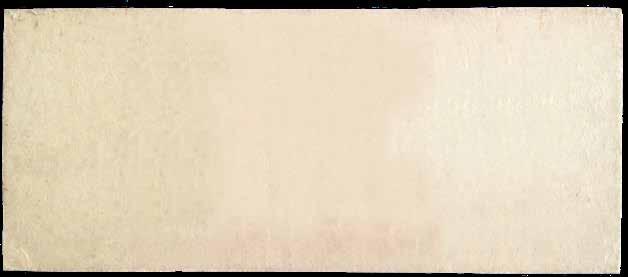

This in-state rivalry was reaching its peak in 1967 when the two teams tied 14-14 at old Hanger Stadium in a game that saw the Colonels rally in the last five minutes to tie the game on a 10-yard run by Bob Beck and a two-point conversion run around the right end by quarterback Jim Guice with 2:40 to go, before an overflow crowd of 15,000 celebrating Eastern’s Homecoming.


The 1967 game would be hard to match in intensity, crunching hits, big plays on offense and defense and excitement, but the following year in 1968 made the ’67 contest look like a walk in the park.
The backdrop for the 1968 EKU-WKU game was to be the dedication game for Western’s new 19,200 seat football venue –– L. T. Smith Stadium. It was to feature the No. 3 ranked Western Hilltoppers, who were undefeated and unscored upon through five games, vs. the 4-1 Colonels, who were ranked No. 11.
The scene was set as more than 20,000 fans packed L. T. Smith Stadium. Another 200 EKU students that made the trip to
Bowling Green watched the action from each end of the stadium through the wrought-iron fence that enclosed the football complex.
Anticipation was running rampant for an epic battle that didn’t disappoint.
Midway through the first quarter, the Western defense led by All-American linemen Romeo Crennel and Lawrence Brame were relentless in their pursuit of sacking EKU quarterback Jim Guice. They finally got to him and slammed him to the ground, forcing the Eastern star to the sideline as the Western faithful erupted with approval.
“WHEN JIM WENT OUT, I DIDN’T KNOW IF HE WOULD BE ABLE TO RETURN BECAUSE HE TOOK A BIG HIT,” said EKU Hall of Fame head coach Roy Kidd.
After a scoreless first quarter, Western punched across the initial score of the game when ’Topper QB Johnny Egan hit split end Jay Davis with a nine-yard scoring pass with 5:26 before halftime to put WKU up 7-0.
THAT’S RIGHT. IN THE ’60S AND ’70S, THE EASTERN-WESTERN FOOTBALL RIVALRY DESERVED TO BE MENTIONED AMONG THE NATION’S TOP GRIDIRON BATTLES.
16 SPECIAL EDITION
But the momentum turned toward Eastern when Guice, who was being walked to the EKU locker room, miraculously came to his senses and trotted back to the Eastern bench.
He was inserted back into the game and proceeded to march the Colonels 60 yards in six plays, culminated by a five-yard scoring pass to flanker Chuck Walroth that tied the game 7-7 with 1:21 left in the second quarter.

“That was a weird feeling to get hit like that,” said Guice. “I tried to get up once and passed out. Everything was going around and around. I looked up once and saw all those people in the stands and wondered, ‘What are they doing here?’”
The second half was all Eastern as the Colonel defense held Western scoreless with only four first downs, while Guice marched Eastern on another scoring drive (78 yards in eight plays), finishing on a six-yard scamper by Guice with 4:17 left in the third quarter.
Placekicker Jerry Pullins hit the game-clinching field goal with 6:24 to play to cap off Eastern’s 16-7 win.
Eastern had overcome all the obstacles that day, playing before a raucous, hostile crowd of 20,000, losing its star quarterback for nearly 15 minutes of action and defeating the No. 3 team in the nation to put itself in position to win its second straight Ohio Valley Conference crown.
TOP:
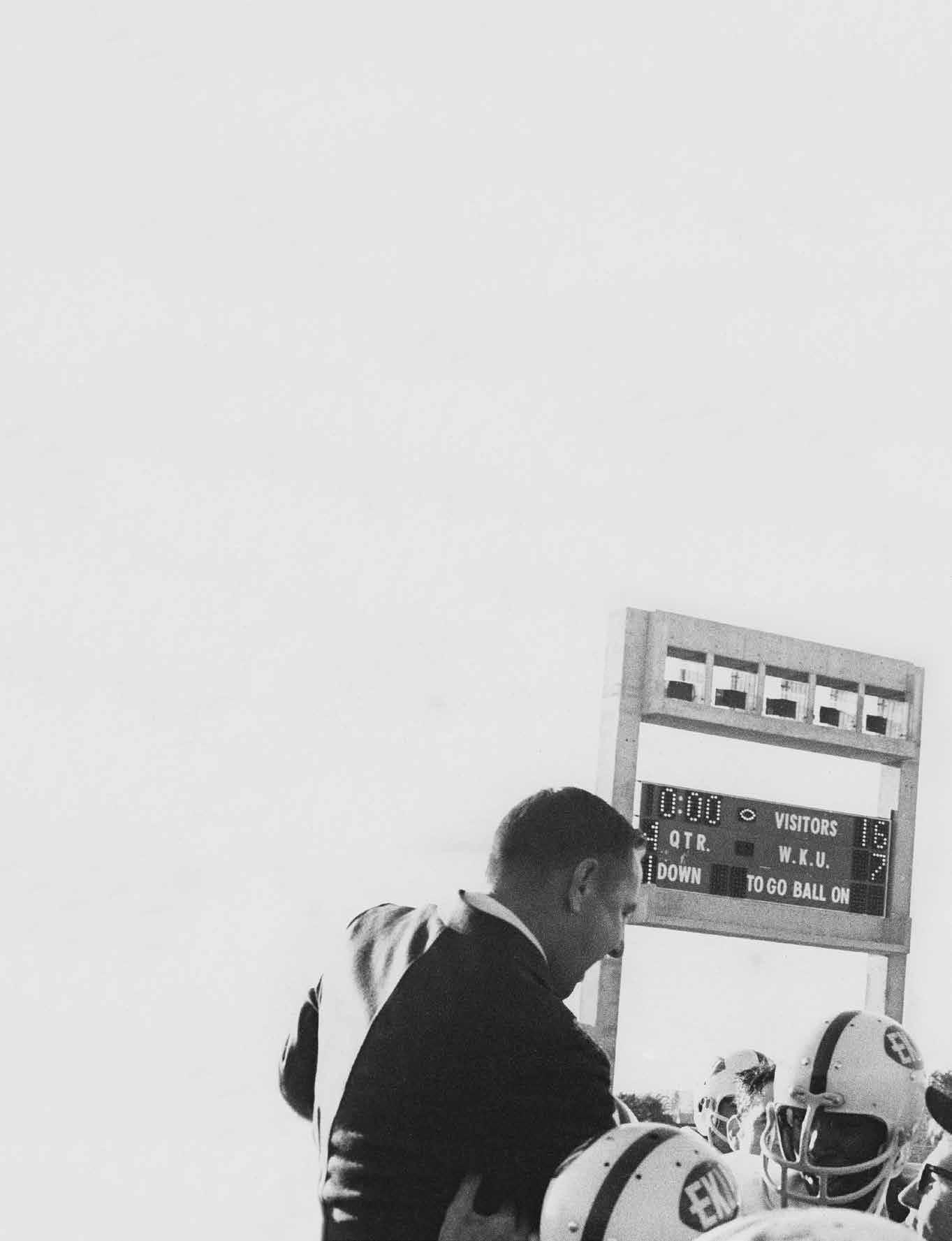
“I’ve been asked many times, ‘What has been your biggest victory at Eastern?’ Of course, it is hard to get past the two national championship (1979 and 1982) wins, but the one that really stands out to me was in 1968 when we went to Western and won such a big game in front of that big crowd,” Kidd said.
“THE GUYS REALLY PUT FORTH A GREAT EFFORT, AND GUICE COMING BACK TO LEAD US TO THE WIN AFTER HE WAS INJURED WAS SOMETHING I WILL NEVER FORGET.”
So, there you have it. A rivalry that would match any in the country: Eastern vs. Western. n
EKU’s Chuck Walroth (33) holds the football high after catching a TD pass that tied the 1968 game in the second quarter.
ADVERSARY TO ADMIRER
by Jack Frost
Roy Kidd has received every coaching award, including induction into six Halls of Fame for his brilliant 39-year Eastern career, but the reverence and respect his former coaching adversaries hold for him may be his highest honor.
Two of the most respected and recognized coaches that led their teams against Kidd’s Colonels are former Austin Peay and Middle Tennessee head coach James “Boots” Donnelly and former Western Kentucky head coach Jack Harbaugh.
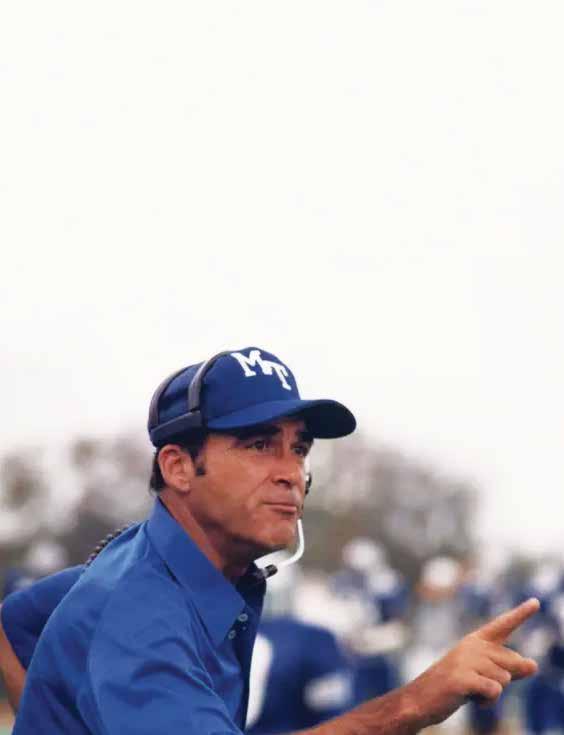
18 SPECIAL EDITION
Donnelly began his college coaching career in 1977 at Austin Peay, where he was a four-time OVC Coach of the Year. After his second season with the Governors, Donnelly returned to his alma mater at Middle Tennessee, where he served 20 years (1979-98) and rebuilt the Blue Raiders program into a perennial OVC and NCAA Div. I-AA championship contender.
“Every player and every coach always knew the importance of the EKU game,” said Donnelly. “We knew we could not make a mistake. Our mental and physical preparation was thorough.” Kidd and Donnelly opposed each other 24 times between 1977 and 1998, with EKU winning 18, most of the battles closely contested until the final horn.
The most memorable matchups for Donnelly came in 1984 when Middle defeated Eastern twice on Hanger Field: 22-10 in the regular season and 27-10 in the first round of the playoffs. “Beating Eastern and Roy twice in the same year at their place is a tall mountain to climb, but we did it,” Donnelly recalled.

Donnelly, who joined Kidd in the College Football Hall of Fame with his induction in 2013, has nothing but admiration and respect for his friend. “Everyone who has coached in the OVC should thank Roy for what he did to promote the game and make the great game of football such an integral part of college athletics. Roy deserves all of the accolades and honors he has received.”
Jack Harbaugh is the well-known football family patriarch and father to Jim and John Harbaugh, who have both been highly successful college and NFL head coaches. The elder Harbaugh enjoyed a distinguished 40-year coaching career that included a head coaching stint at Western Michigan and assistant coaching positions at six universities, including Morehead State, and seven years as defensive backs coach under Bo Schembechler at Michigan, where he helped lead the Wolverines to five Big Ten titles.

EKU MAGAZINE 19
PREVIOUS PAGE: Longtime Middle Tennessee Coach Boots Donnelly. AT RIGHT: former Western Kentucky Coach Jack Harbaugh.
“EVERY PLAYER AND EVERY COACH ALWAYS KNEW THE IMPORTANCE OF THE EKU GAME.”
––BOOTS DONNELLY
During his 14 years (1989-2002) in Bowling Green, the Commonwealth’s fiercest football rivalry, Eastern vs. Western, still existed. Perhaps the most important meeting during Harbaugh’s tenure occurred in 1997, when the Hilltoppers ended Eastern’s season with a win in the I-AA playoff quarterfinals. But Kidd’s teams claimed a 7-6 advantage in the series with Harbaugh’s Hilltoppers.
Harbaugh’s teams lost to Eastern the first four times they met. It wasn’t until the season opener in 1993 that he was able to defeat Kidd’s Colonels. The 15-10 win at Roy Kidd Stadium gave Harbaugh reason to finally celebrate.
“After the game and all of the celebrating was over, I decided to ride back to Bowling Green with my family and let one of my assistants go back with the team. As we were heading back, we stopped at this little convenience store outside of town, and I went in to buy a beer. I was still wearing my
Western shirt and cap. I went up to the counter and asked if I could have a beer. The clerk told me we were in a dry county and he couldn’t sell me a beer. I explained who I was and told him that my team had just beaten Roy Kidd and EKU for the biggest win of my life and I really would like to have a cold beer to celebrate the occasion. He told me he was sorry, but he wasn’t going to risk losing his license. So, I left the store and went back to the car. Before we could pull away, we heard a thumping on the window, and I rolled the window down to see this guy standing there, and he said, ‘Buddy, I’ve never seen a guy that needed a beer more than you.’ So, he reached into his coat and pulled out a beer.
“The excitement of finally being able to beat that man and finally finding a way to put more points on the scoreboard than what he got is a special moment in my career.”
Both Harbaugh and Kidd retired from coaching after the 2002 season, and when Eastern held a retirement celebration for Kidd, Harbaugh and his wife attended. Harbaugh said he wanted to be there to honor his friend and coaching colleague for the great legacy he left Eastern and, more importantly, the legacy he left football.
“I’m a great football buff, and the game of football is so important to me,” Harbaugh said. “By the time Roy Kidd retired in 2002, he had made me a better football coach and left football a better game.” n

ABOVE LEFT: Hilltopper players lift Coach Harbaugh in celebration of a hard-fought victory, but the Colonels won seven of the 13 games Kidd and Harbaugh were opposing coaches. AT LEFT: Coach Donnelly.


20 SPECIAL EDITION
“BY THE TIME ROY KIDD RETIRED IN 2002, HE HAD MADE ME A BETTER FOOTBALL COACH AND LEFT FOOTBALL A BETTER GAME.”
–JACK HARBAUGH
by Marc Kidd

Roy and Sue Kidd Way is a two-way street that sits at a crossroad of moments and memories in front of Roy Kidd Stadium on the campus of Eastern Kentucky University. The memories are rooted in a consistent, loving, competitive spirit displayed at elevated levels over a lifetime of football fields, basketball courts, parades, dorms, dinner tables, fellowship and the Campus Beautiful.

EKU MAGAZINE 21
You know them as Roy and Sue. My sister, Kathy, and brother, Keith, know them as Mom and Dad! Today, many EKU students see a stadium, statue and street. But back in the day, students, cheerleaders, football graduate assistants, managers and players saw in them their college mom and dad who provided guidance, kindness and “tough love” when it was required.

Roy was a competitive all-sport athlete from Corbin, Ky. who excelled in football, basketball and baseball. Roy arrived at Eastern after a drive from Corbin with his oldest brother, Earl, who dropped him off after turning onto what would become Roy and Sue Kidd Way. Roy had a suitcase and no idea what his future would hold on the campus he would spend his life.
Sue was a champion majorette baton twirler whose performance was a combination of dance, movement, gymnastics and grace at the front of the band in gyms and on football fields. Baton twirling is as mentally challenging as it is physically demanding, and there is no room for mistakes as you throw the baton into the air and catch it as it hurls back to earth.
Roy met Sue (or “Sue flirted” with Roy in his telling of the story) at Madison High School when he was the football coach 1956-61 and Sue was a student and majorette. Roy’s first year at Madison High followed the Brown vs. Board of Education ruling that resulted in school integration. Amidst that backdrop, the Madison-Model Royal Purples became legendary in Richmond as they racked up wins across the state.
Roy and Sue married in 1961 and, having both been athletes, had no illusion their path would be easy or without hard work. They intuitively understood that great teams have leaders who work together to meet the common goals for the good of the team and embraced their role to be those models for their students.
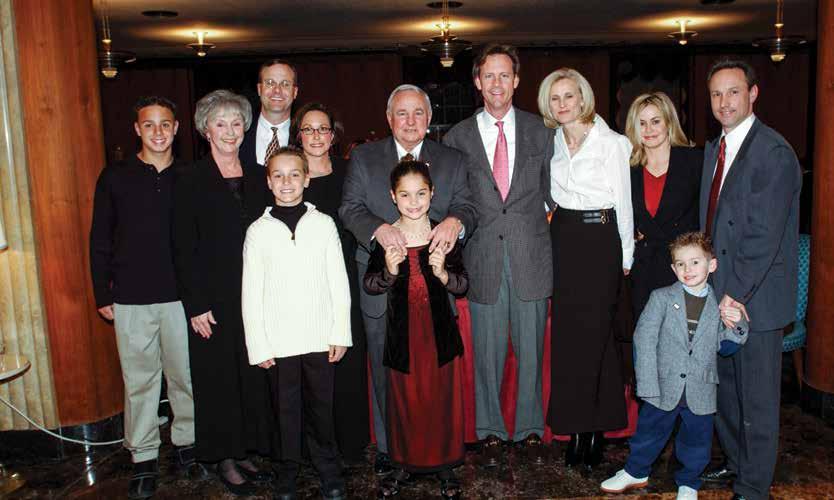
Dad would organize practices with his daily schedules, and Mom would manage the coaches and players’ wives for Friday’s “brownies and goodies” with the team before each home game. Both Mom and Dad would cheer you on but also “tell it like it is” when you were not getting the job done at home, school or in life.


22 SPECIAL EDITION
THE KIDD FAMILY: from left, Nicholas Kuhl, Sue Kidd, Lewis Kuhl, Evan Kuhl, Kathy Kuhl, Kirsten Kuhl, Coach Kidd, Lee Kidd, Marc Kidd, Amy Kidd, Lori Kidd, Kody Kidd and Keith Kidd.
We lived on campus when Dad returned to Eastern with Mom, me and my sister in 1964, after a year in Morehead. The campus house we lived in sat at the dead-end of Park Drive, where Hanger Field was in view out our front window, and extra points cleared the goal post, with a chain-link fence separating our campus house from the football field. Case Hall was in view, and many days students, players and cheerleaders would stop by to visit or babysit me, my sister and brother, who was in diapers by then.
I remember sitting in the dark watching film with Dad and his coaches, with the smell of stale coffee in the air, knowing he had a player who was in “hot water” coming to chat with him and thinking, “I am glad it’s not me.”
Keith, Kathy and I were at a disadvantage when we got in “trouble” and tried to put a positive spin on the story Dad hadn’t already heard as a college coach in the ’60s. We had an unspoken code of not causing trouble on game day when Mom had her hair in curlers and was putting on her makeup because she could be deadly with a swat on the bottom when you were misbehaving and didn’t think she was watching or listening.

Roy and Sue’s kids are grown with their own families and fond memories from our time in Richmond and as EKU graduates. Dad is now in his 90s, his mind is sharp, and he moves well enough to have won a “cornhole championship” at McCready Manor. If you see a picture of him accepting the trophy, you can see Mom in the background with her arm raised high, cheering him on … after all these years!
That’s my parents: Roy and Sue, a lifetime partnership with three kids and a two-way street! n



EKU MAGAZINE 23
Associated Press
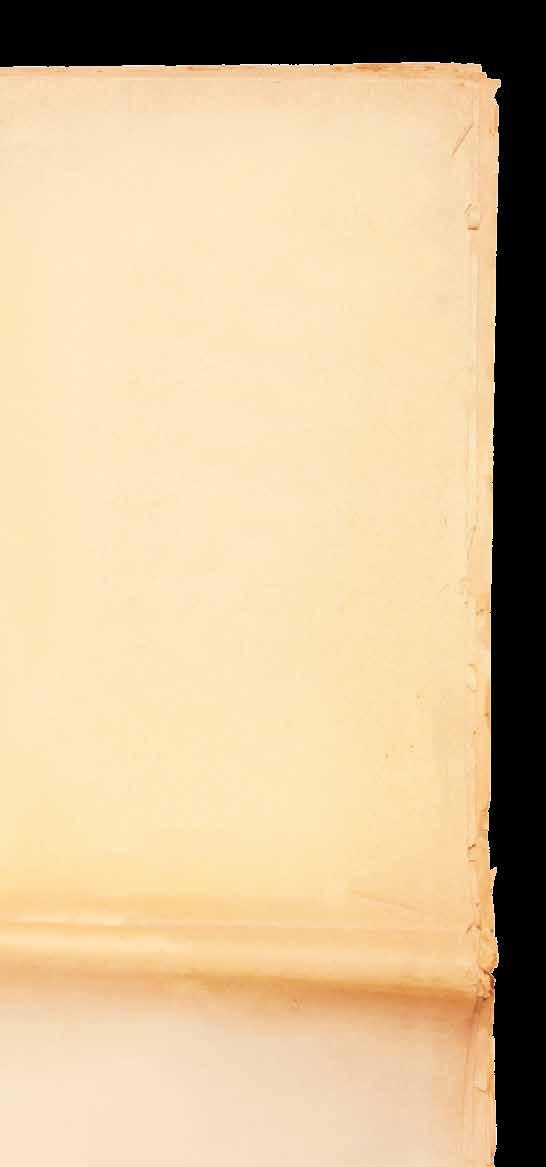
Top: Tailback Ed Hairston makes a cut against the grain in the Colonels’ 23-17 win at Boise State in the I-AA semifinal. Above: Linebacker Alex Dominguez (46) receives congratulatory hug from head coach Roy Kidd after making a big stop in the Colonels’ 23-17 win in the 1981 playoffs at Boise State.


Racing results Outdoors
Sports results, 582-4871
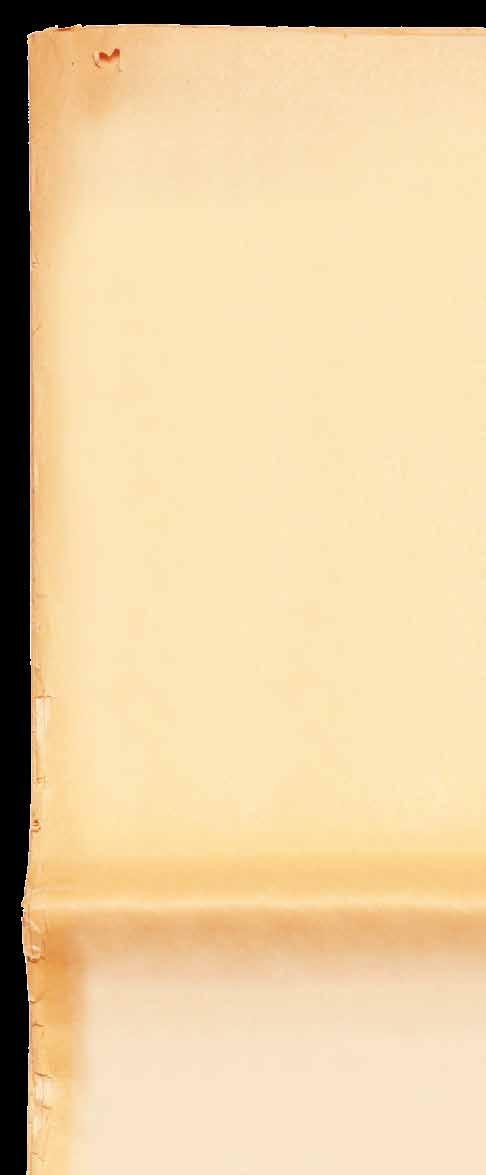
Eastern holds off
By STAN SUTTON Courier-Journal Staff Writer
BOISE, Idaho –– The din was deafening. One of America’s least populated states, Idaho, sent 20,176 of its natives into Bronco Stadium here yesterday with a singular purpose: to destroy a team two time zones away that had suddenly become an archrival.

The Big Sky was on a Big High as Eastern Kentucky marched into the valley of death that is in reality a valley in the Rocky Mountains. And like your mailman, neither snow nor wind nor vicious cheers could stop the Colonels from earning a 2317 victory over the team that beat them for last year’s NCAA Division I-AA national championship.
Eastern’s win gives the Colonels a berth in the Pioneer Bowl on Saturday against Idaho State, a 41-12 victor over South Carolina State yesterday. Incidentally, Idaho State defeated Boise 21-10 on September 19.
A year ago in sunny Sacramento, Calif., Boise State had marched 80 yards in the last 55 seconds to beat Eastern in the I-AA title game. But the revenge factor seemed to rest with Boise State yesterday. After that game, several Eastern players had said the Broncos weren’t as tough as teams in their own Ohio Valley Conference. Boise coach Jim Criner, knowing a good psychological tool when he sees one, had made sure 50 players and all points from Canada to Utah knew about the remarks. But for two and a half quarters, Eastern had shut down both Boise State and its fans. Boise’s hopes were going downhill like a skier on new snow, and not until its artificial turf was covered by the white stuff were the Broncos on their own turf.
It was at 8:03 of the third quarter that Criner sent in his best skater, French-Canadian Gerald DesPres. The crowd responded, and so did
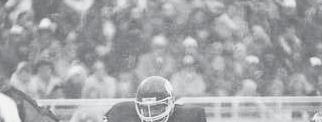
Associated Press
Eastern Kentucky quarterback Chris Isaac prepared to hand the ball off during a 23-17 win over Boise State in the NCAA Division I-AA semifinals yesterday.
The Courier-Journal, Sunday morning, December 13, 1981
C SPORTS
Boise in the snow, advances to final
DesPres. With 55 seconds left in last year’s game, Boise still needed to go 80 yards to win. With 55 seconds left yesterday, the Broncos needed to go only 43 for another miracle finish. “I thought it was going to be a repeat of last year,” said Eastern guard Kevin Greve. “I was scared.”
“I was thinking, ‘Here we go again.’” Admitted Eastern coach Roy Kidd.
DesPres, who calls the signals despite speaking only broken English, launched Boise State’s final drive from its seven-yard line with 1:51 left. As the Eastern defenders slipped repeatedly on the icy field, DesPres completed four passes and Boise was suddenly fourth and two at the Eastern 35 with 19 seconds left. That’s when the game took a French twist. DesPres, a walk-on freshman from Montreal, was told by the English-speaking Criner to throw a curl-in pass. He misinterpreted the instructions and instead ran a quarterback sneak, coming up four inches short of a first down.
“I thought he had it, although our kids were saying he was short,” Kidd said.
“I about died,” Criner said. “I was hollering, ‘What happened?’ Did he call an audible or something?”
“He has trouble with the English language. He didn’t say, ‘Coach, I’m going to run a quarterback sneak.’”
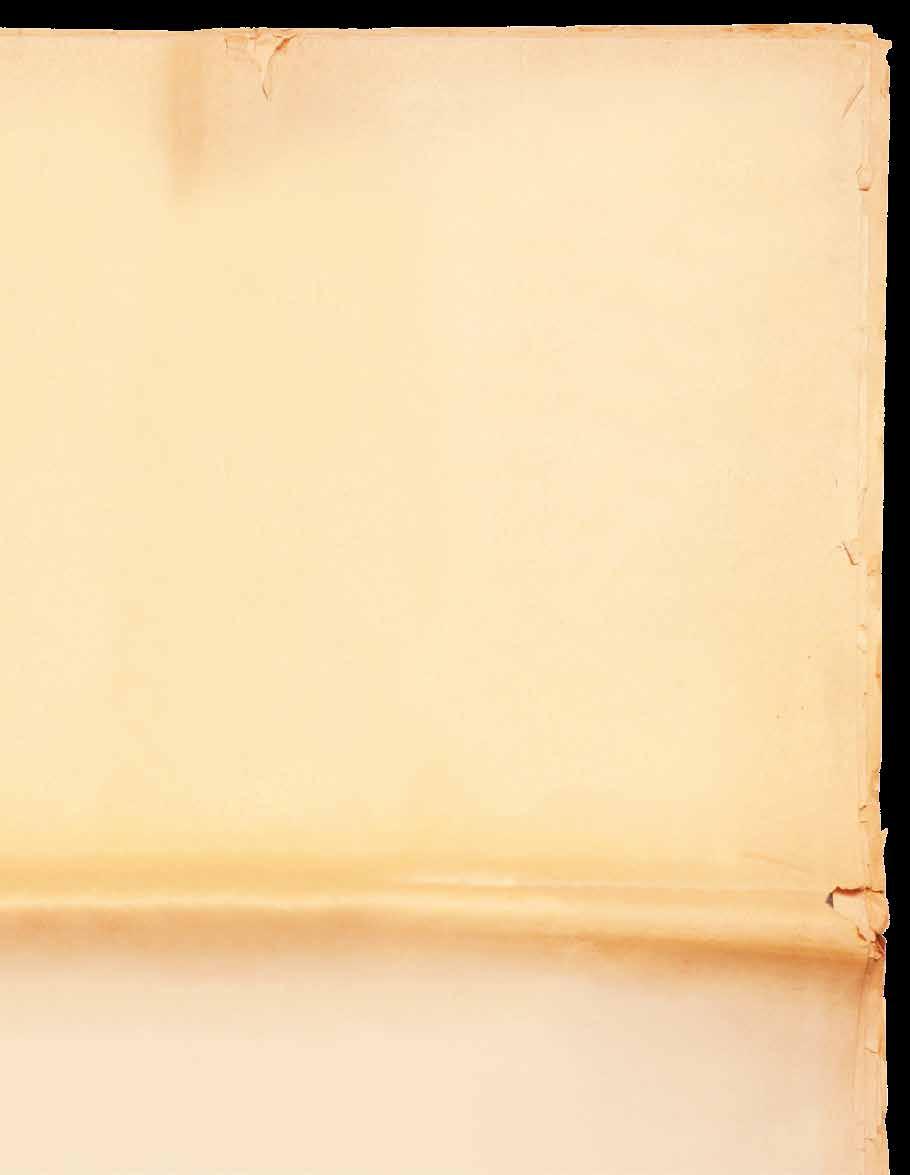
DesPres, who completed nine of 14 passes, hit a 50-yarder to Kipp Bedard shortly after he replaced Tim Klena at quarterback. That lit Boise’s fire and a match under its crowd, which was a record number for a I-AA playoff game. On the play following the 50-yarder, Boise scored on a 15yard run by tailback Rodney Webster to cut Eastern’s lead to 17-10.
However, as the fourth quarter opened, the Colonels were on a march spearheaded by reserve tailback Ed Hairston. Hairston
trudged through the snow for 55 yards in six carries on the march, as Greve, Chris Taylor and David Dihrkop served as snowplows in front of him.
Starter Terence Thompson then gave Hairston a breather, but on his second carry from the Boise State five, Thompson fumbled a high pitch from Chris Isaac and lost eight yards. So, Eastern had to settle for a 31-yard field goal by Jamie Lovett that gave the Colonels a 20-10 edge with 11:32 left in the game.
Eastern’s Gus Parks intercepted his second pass of the game with 101/2 minutes left, and when Lovett kicked his third field goal from 32 yards, there were only six and a half minutes left. Boise State was looking at a 23-10 problem. By the four-minute mark, Boise was looking at only a 23-17 deficit, and Eastern seemed to be looking at the problem. Both Eastern’s woes and the crowd’s noise intensified as Colonels punter Lanny Sanders kicked from his 46 with 2:30 left to play. He lined the ball, but a Boise deep man slipped, and the football rolled all the way to the Bronco’s seven.
DesPres completed three passes to advance the ball to Eastern’s 43, where a third-and-10 pass came up two yards short. The missed communications and the unsuccessful quarterback sneak followed, and Eastern was in position to win its second national championship in three years.

Eastern had quieted the crowd early in the game when Ranard McPhaul scored on a 38-yard reverse with 8:50 left in the first quarter. Tron Armstrong and Chris Taylor had crucial blocks. Later in the period, the Colonels were marching steadily when Thompson fumbled at the Bronco’s 40 and Boise’s John Rade recovered. Boise rebounded from that to score on a 30-yard field goal by Kendrick Camerud, one play after Byrd had dropped an easy interception in the end zone.
Split end Steve Bird (21) of Eastern and defensive back Kevrette Johnson of Boise Stae scrambled for a loose ball during yesterday’s NCAA Division I-AA semifinal playoff game. Eastern won 23-17 to advance to the title game against Idaho State.
Lovett got that back with a 44-yarder at 4:02 of the second quarter. Boise let two scoring chances get away in the last minute of the half. The Broncos moved to the Eastern 12, where parks intercepted a pass after Byrd popped up the ball with an intimidating hit on Bedard at the goal line. Then, Boise failed to recover a fumble by Isaac at his own 39 on the half’s final play
that would have given Camerud time for a field-goal attempt. The ball popped three feet behind Bedard, who failed to see it and allowed Jon Sutkamp to come from 10 yards away to recover. Eastern, which will take a 11-1 record into the title game, got its final touchdown on its first possession of the second half. Alex Dominguez intercepted a pass by Klena at the Colonel 41, and Nick Yeast scored from the one.
Associated Press
EKU MAGAZINE 25
1977

House, Mitchell, EKU defense rips Western
Colonels’ fired-up offense unleashes
BY KEN GREEN Sports Editor
Powered by heads-up defense and an awesome offense, Coach Roy Kidd’s Colonels vented three weeks of frustration on Western Kentucky University Saturday afternoon at Hanger Field as EKU rolled to a 35-10 shellacking of the Hilltoppers.
A record-breaking crowd of near 25,000 packed Hanger Stadium for Homecoming ‘77 as WKYT-TV’s cameras aired the lopsided victory throughout Central Kentucky.
Of course, a win over Western by any margin is a treasured commodity to Eastern athletes and fans alike, but Saturday’s score marked EKU’s largest margin over the Hilltoppers since the two rivals’ first meeting in 1914, won by the Maroons 36-6.
Despite a fumbled (but recovered) pitch-out in the early opening seconds, the Colonels’ offense played with near perfection as senior quarterback Ernie House and junior tailback Stan Mitchell turned in their most impressive performances of the ‘77 season.


House hit Western’s defense where it really hurt . . . in the secondary, as the London signalcaller connected on nine of 15 passes for 163 yards and three touchdowns. The key target for
35-10 embarrassment upon arch rival Hilltoppers
House’s aerials was flanker Jim Nelson, who hauled in three receptions for 47 yards, two catches of which resulted in Colonel TDs.
House’s third touchdown strike sailed 39 yards to Stan Mitchell, speeding his way untouched to the end zone. This particular move drew a special thrill from Coach Kidd, who was already on “cloud nine” after the big win. The EKU mentor had reflected on Mitchell’s early attempts two years ago to make it as a wide receiver.
Mitch’s heroics proved to be the sparkplug for EKU’s momentum as the speedy Lexington product totalled 119 yards in 18 carries, while heading for the bench in the fourth quarter to give Colonel subs some game experience. His second of three touchdowns came via a pitchout from House from two yards out, while the third TD was on an eight-yard scamper.
Eastern’s other pair of touchdowns made the scoreboard on respective strikes of 21 and 24 yards from House to Jim Nelson. Soccerstyle kick specialist, Dave Flores, made all his conversions, while barely missing a 52-yard field goal.
Western’s offense was unable to get any momentum (with the exception of the scoring drive in the final seconds) due to an outstanding effort by the EKU
defense, led by quick end Chris Roberts and cornerback Anthony “Smokey” Miller.
Roberts finished the game with 10 solo tackles and three assists, while Miller had nine solos and one assist, while batting down a WKU field goal attempt in the first quarter. The pair’s other accomplishments included two quarterback sacks, batting down two passes and causing two fumbles.
With the exception of Dave Betz’ 35-yard field goal in the first half, Western’s only other score
came on a fourth-and-goal with eight seconds left in the game.
Runningback Mike Hayes surprised the Colonel defense when he took a pitchout, went left and passed to flanker Bill Lindsey for a touchdown. Betz’ kick sealed the final 35-10 verdict.
Looking quickly at some of the final statistics, Eastern rolled up 172 yards rushing and 163 passing, while Western had 244 and 86 yards, respectively, in those departments. The Colonels had 15 first downs as compared to WKU’s 19.
Individually, Western tailback Jimmy Woods led all ground gainers with 12.8 yards on 19 carries, while EKU’s Stan Mitchell was next in line with 119 yards on 18 carries. However, “Mitch” sat out the final quarter as Coach Kidd gave his bench some valuable experience.
Hilltopper quarterback John Hall completed only nine of 20 passes for 82 yards. Flanker Billy Lindsey led Western in receptions with five for 45 yards.
Now 3-3 overall and 2-2 in the OVC, the Colonels hit the road Oct. 29 for a game with Murray, while Western prepares to entertain a tough Morehead squad for its homecoming. The Hilltoppers are now 1-6 overall and 1-3 in the OVC.
Page 10 Richmond Daily Register, Monday, October 24,
Stan Mitchell gets up some speed around left end as EKU fullback Steve Streight opens an avenue of escape for the quick tailback. Being eliminated from the pursuit for Western is defensive end Lonnie Hardin. Mitchell scored three touchdowns and rolled up 119 yards as Eastern Kentucky University posted a 35-10 homecoming victory over the rival Hilltoppers before 25,000 fans at Hanger Field.
–– Staff Photos By Ken Green
Eastern kick specialist Dave Flores is shown attempting a 52-yard field goal as quarterback Ernie House holds. Flores’ boot fell short of the cross-bar by only a few feet. However, the freshman kicker made all five conversions in the 35-10 victory.




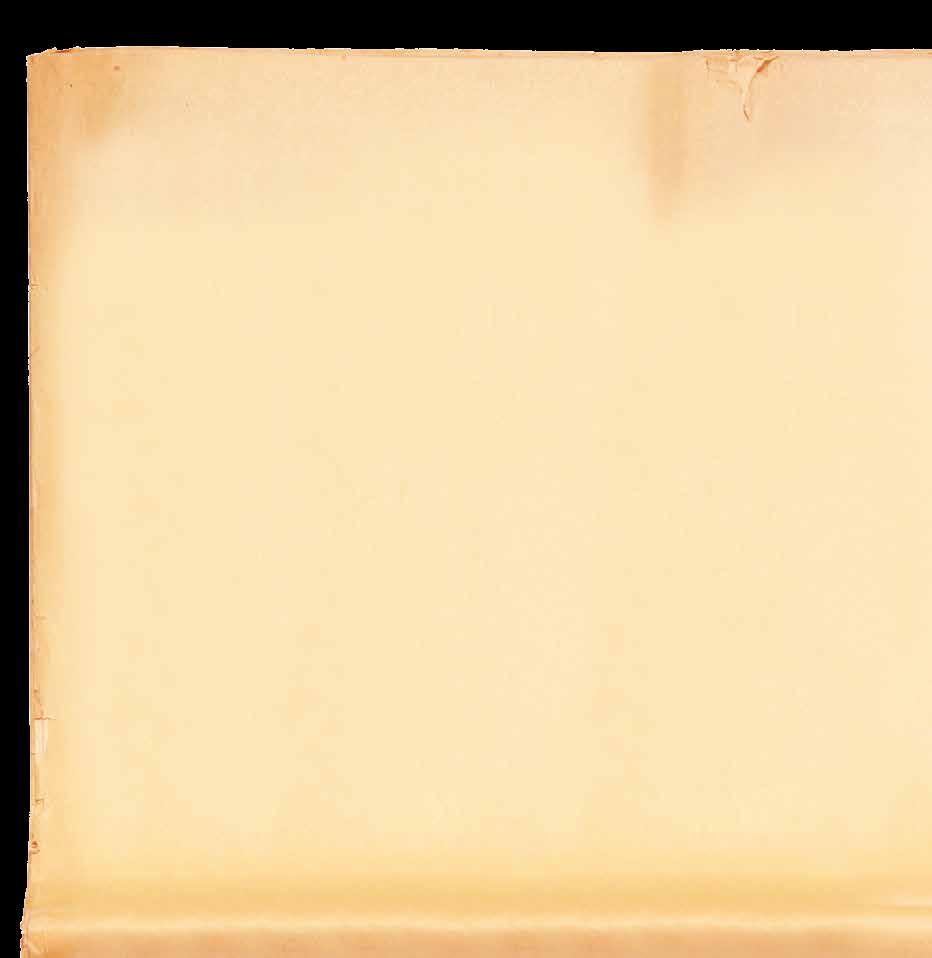



EKU MAGAZINE 27
Richmond Daily Register,
Tailback Stan Mitchell prances into the end zone for one of three touchdowns tallied by the Lexington junior as Western Kentucky’s James Jones, 45, and Fred Kixmiller, 27, look on helplessly. “Mitch” had a banner day, rolling up 119 yards on 18 carries. One of his TDs came on a brilliant 35-yard pass from Ernie House.
Eastern flanker Jim Nelson jumps for joy in the end zone after hauling in a 24-yard pass from quarterback Ernie House in Saturday’s big 35-10 televised football game at Hanger Field. The victory marked EKU’s largest margin over the Hilltoppers since the two schools’ initial confrontation in 1914, when the Maroons won 36-6. Nelson caught another 21-yard pass from House for his second score of the day.
Pictured catching a long strike from Ernie House is flanker Jim Nelson as the junior receiver heads downfield for a big gain. Moving in for Western are linebacker Charlie DeLacey, 60, and Fred Kixmiller, 27.
FOR A LITTLE MORE THAN 10 YEARS STARTING IN 1979, THE BEST COLLEGE FOOTBALL IN THE STATE OF KENTUCKY WAS NOT PLAYED IN LEXINGTON OR LOUISVILLE. IT WAS PLAYED IN RICHMOND AT EASTERN KENTUCKY UNIVERSITY.
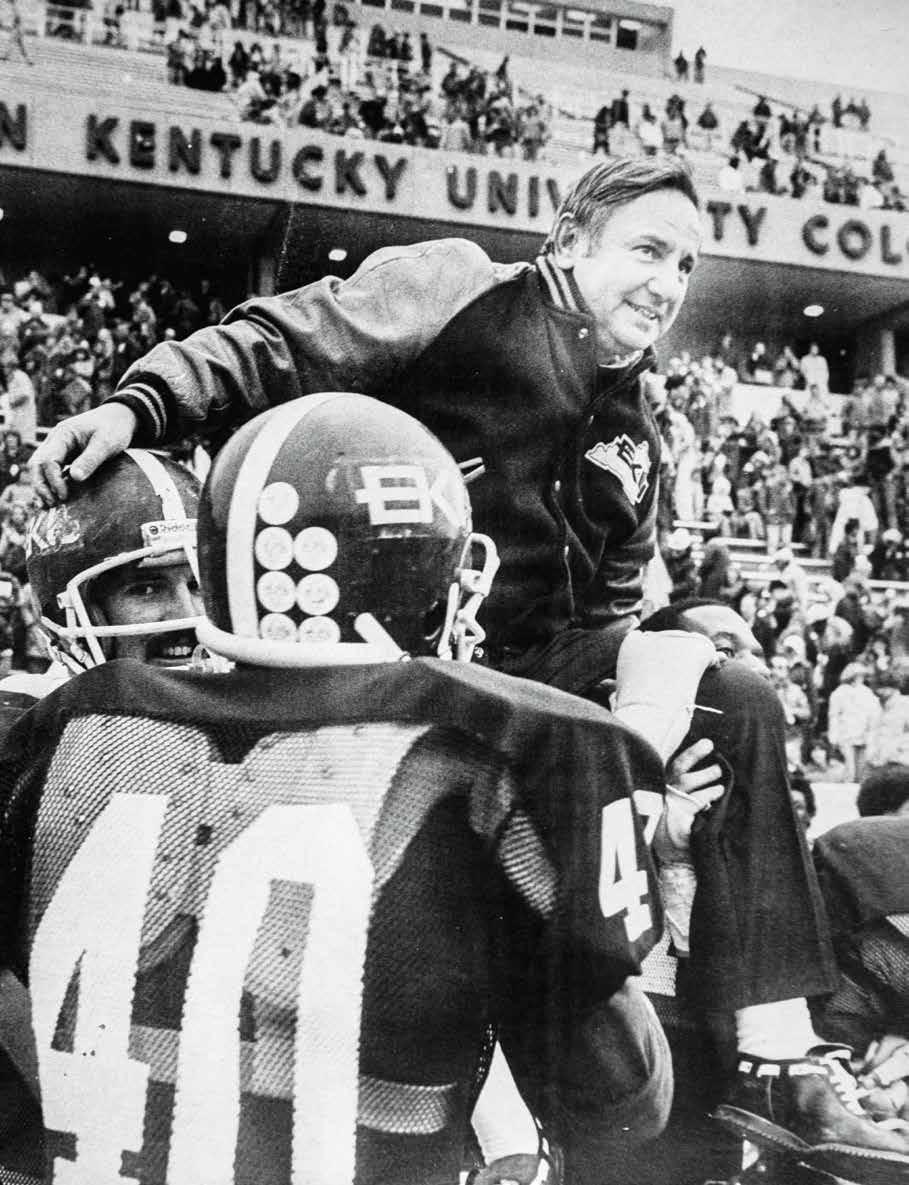
thE glory Years
By Steve McClain
28 SPECIAL EDITION
The Colonels’ dominance started in 1979 with a I-AA National Championship, followed by back-to-back national runners-up finishes and another national championship in 1982. And while EKU has not won a national title since, the Colonels continued to be a national power for years afterward.
For players, sports reporters and students during those seasons, it was a magical time, and a lot of the credit has to go to Coach Roy Kidd.
“EKU was nationally relevant, and with all due respect, Kentucky was not,” said Dick Gabriel, a long-time Lexington TV and radio sports journalist. “I would remember doing my radio show at WVLK, and Kentucky fans would complain, and I would say, ‘I get it.’ I would tell them if you really want to watch competitive football, go 25 miles down the road and go watch Eastern Kentucky University. It was great college football. I don’t care what level it was.”

In fact, Gabriel helped increase exposure for the Colonel program by hosting the first Roy Kidd Show.

“There was a lot of interest in EKU football, and there were sponsors willing to back it. I think a lot of the credit goes to the Worn Cleat Club, who thought Roy Kidd deserved more support in the fanbase.
“I enjoyed putting it together. It meant spending more time in Richmond and doing a feature every week. Roy was appreciative and good to have on set. Roy gave us access, and we were able to do feature stories like the history of ‘Cabin on the Hill’ (sung after every Colonel win by the players).”
Student reporters at the Eastern Progress reveled in the same access major media outlets enjoyed in covering the Colonels.
“It was a great time to be at the student newspaper because you had this flagship program that was nationally prominent,” said Mike Marsee, former sports editor at the Progress in the
mid-1980s. “There was an excitement level on campus, and football games were a must-see event. The level of football and expectations for the program were at such a high level at that time. Even though they didn’t win championships after ’82, they won conference championships and were in the playoffs for such a long stretch of games.
“The big games like a rivalry game against Western or a big conference game against Middle Tennessee, you could see what that meant to Coach Kidd.”
So, what was the secret to Kidd’s success during those years?
“Roy knew what he wanted to do, and he was able to get the kids that he needed to do it with,” Gabriel said. “He recruited a lot of linemen from Kentucky and got skill kids from Florida and South Georgia thanks to a pipeline from there with former players and coaches.
“Roy loved to run what now is called the RPO (run-pass option), and he had good running backs. You had Elroy Harris and James Crawford, or it could be Markus Thomas or Tim Lester. You could feel the crowd rise to their feet every time a running back got to the edge because fans realized something incredible was about to happen.”
EKU MAGAZINE 29
FOR PLAYERS, SPORTS REPORTERS AND STUDENTS DURING THOSE SEASONS, IT WAS A MAGICAL TIME, AND A LOT OF THE CREDIT HAS TO GO TO COACH ROY KIDD.
PREVIOUS PAGE: Buddy Moor, left, and Ed Hairston hoist Coach Kidd after defeating Nevada Reno in the semifinal win in 1979. ABOVE: Longtime Lexington media personality Dick Gabriel interviews Coach Kidd on his weekly TV program.
Players and assistant coaches alike credited Kidd’s attention to structure and detail as important to the Colonels’ success during that time period. Also, Kidd’s coaching staff had worked together for several years.
PLAYERS AND ASSISTANT COACHES
“It was a combination of getting the right players and getting them to believe in Coach Kidd’s program,” said Teddy Taylor, who played and coached under Kidd. “He had the running backs, defense and secondary, and it all just came together. Guys just started believing in the program. Next thing you know, we are on TV and going to play for national championships. He had good players and good coaches that had been together a long time. We all liked each other.”
Jim Tanara, another assistant coach who came to EKU via Bear Bryant’s Alabama staff, said Kidd developed players.
“We were able to recruit really good players. And the thing he does better than a lot of coaches is he developed players. He wanted two types of players and looked for two things ––can he run and can he hit. If he runs and hits, we will make a player out of him. We never turned down speed. From there, he developed them and made a player of them. He also would move them around or just lead them to get better and better.
“The thing about Coach is he knew how to win. He knew what it took to win. And not a lot of coaches know that. They think they know but don’t really know what it takes. Joe Blankenship, bless his soul, he described him well –– he just has the ‘it’ factor. He brought the team and the players together who came from all over … Florida, Tennessee, Georgia, Ohio.”
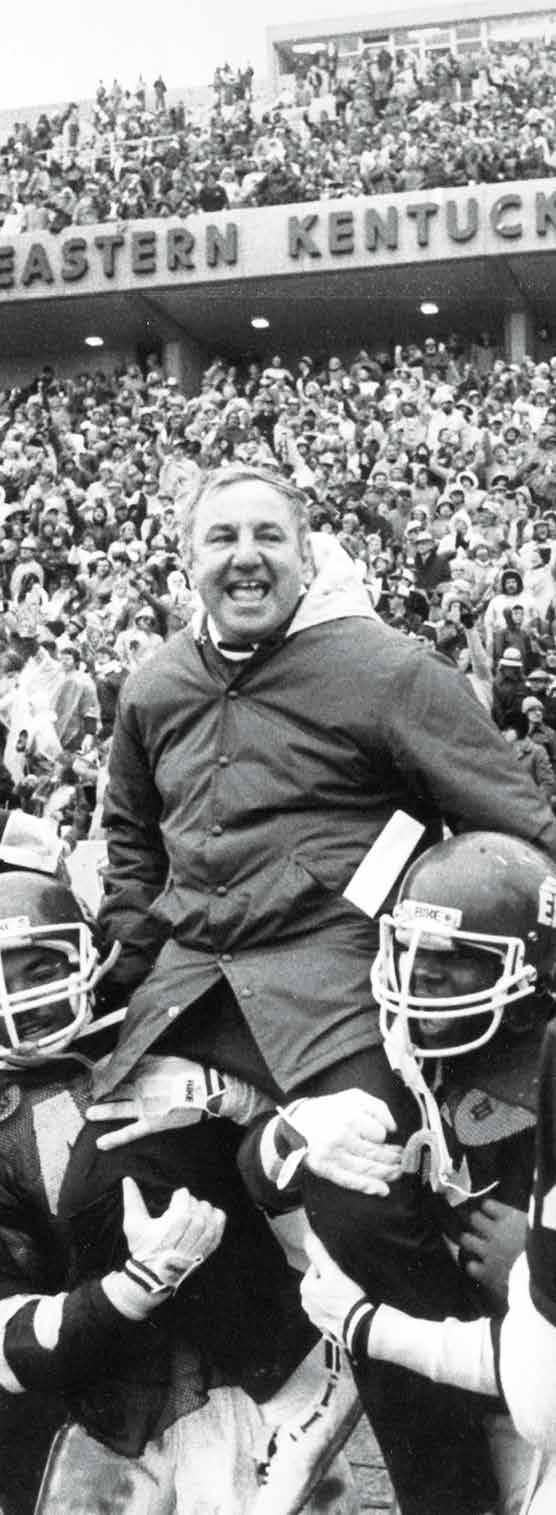
Alvin Miller, who played for Kidd from 1977 to 1980 and was MVP in the 1979 Championship game, said Kidd embodied qualities that appealed to him as a young man.

“He was very structured and wanted it done his way, and if you didn’t, you better have a good reason why you didn’t. He was tough, but he was very compassionate.”
Miller said the game that stands out to him is the 1979 title tilt, a 30-7 win over Lehigh.
30 SPECIAL EDITION
ALIKE CREDITED KIDD’S ATTENTION TO STRUCTURE AND DETAIL
AS IMPORTANT TO THE COLONELS’ SUCCESS DURING THAT TIME PERIOD.
“We knew we were smaller than a lot of schools but well trained by Coach Ison and Coach Hart. Nobody was faster or quicker than we were. Nobody had the determination we had.
“I wear the championship ring and wear it everywhere I go. I’m a bishop, and most bishops get a bishop ring, but I wear my national championship ring.”
TUCK WOOLUM, WHO PLAYED QUARTERBACK ON THE 1982 NATIONAL CHAMPIONSHIP TEAM THAT WENT 13-0, SAID KIDD INSTILLED A BELIEF THEY WOULD WIN.
Tuck Woolum, who played quarterback on the 1982 National Championship team that went 13-0, said Kidd instilled a belief they would win.
“Coach Kidd had the knack of finding someone who may be a little smaller or slower and develop them. Our weight program with Jack Ison was better than anyone around,” Woolum said.
“He just made us all believe. We weren’t the most talented team, especially in 1982, but we believed we were the best team ever.”
That belief was needed in several games during 1982, including a dramatic 21-20 home win over Murray State when Woolum found Steve Bird in the end zone in the final minute –– a victory still talked about today.


Such moments and games sealed the legendary status of those years.
“It was college football the fans would hope it could be, maybe not win every game, but a shot at winning every game because they played so well,” Gabriel said. “That’s all you can ask for.”
EKU MAGAZINE 31
n
PREVIOUS PAGE: Coach Kidd rides the shoulders of two players after a home semifinal victory over Tennessee State in 1982. ABOVE: George Floyd (8) and Joe Richard (61) join Coach Kidd after the 1979 championship win.
by Marla Ridenour
A REPORTERgets her start
Without these two men, I never would have spent 45 years as a sportswriter for newspapers in Lexington, Ky. and Dayton, Columbus and Akron, Ohio.
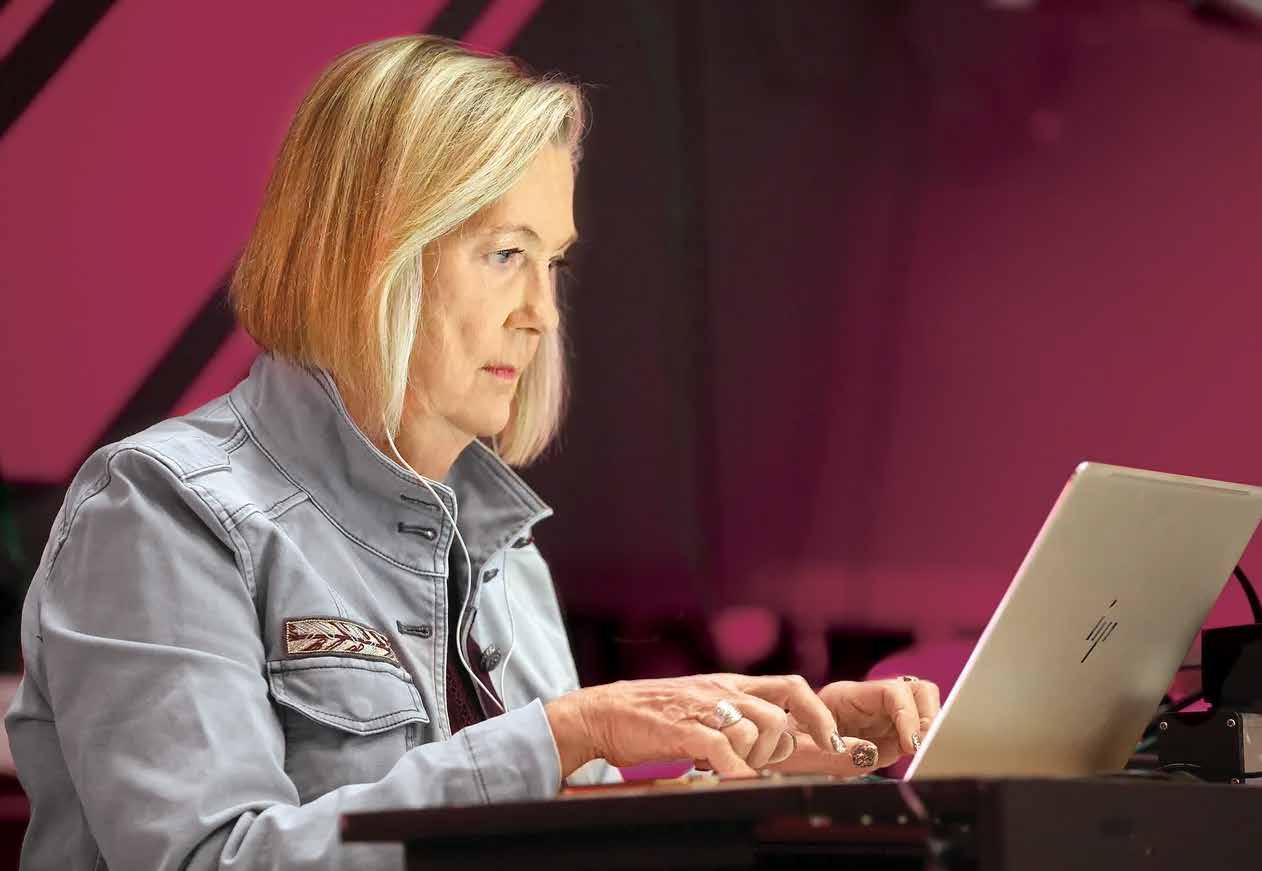
32 SPECIAL EDITION
An original pencil and watercolor portrait of Roy Kidd hangs in my office.
A pensive Kidd looks at a framed photograph of my U.S. Coast Guard gunner father during World War II in a bedroom doorway.
And while it was my late dad Les who kindled my love of sports and pushed me forward with an ultimatum of “You either understand what a first down is or we’re not coming next week” at a Seneca High School football game when I was a seventh-grader, it was Kidd who gave me the courage and reassurance that I was choosing the right path.
I had written only one sports story in my life when Eastern Progress editor T. G. Moore signed off on a one-semester trial for me as sports editor. Part of the cachet was that I would be the first woman to hold that position at a Kentucky university. It was a piece on intramural racquetball, hardly a qualifier for covering an Ohio Valley Conference football power like EKU.
I had been on the Progress staff for a year, writing about increasing enrollment and the like. I had no idea I was about to step into the domain of a coaching legend.
But Kidd never came off that way to me. To this day, I’ve seen no hint of ego. In recent years, he has greeted me as warmly as he did during our once-a-week sessions in his office in between games.
At the team’s banquet after an 8-2-1 season in 1975, he uttered the second most important sentence of my career, surpassed only by my dad’s first-down demand. Kidd stood up in front of the Colonels and their families and said I had proved to him that a woman could know more about football than he’d ever expected.

I was seated off to the side, not in his line of sight, which made it all the more surprising.
I needed that validation.
When I came to Eastern, I thought I was going to be a physical therapist, but the difficulty of getting into out-of-state postgraduate programs scared me off. I took an aptitude test at the counseling center designed to match my strengths with potential careers. Journalism was one. Since I’d written a “My Career in Journalism” report in fifth grade (complete with letters on the cover cut from the newspaper) and had been on the yearbook staff in high school, I dove in.
But without Kidd’s acceptance and honest cooperation, my plan could have been rerouted again.
EKU MAGAZINE 33
Marla Ridenour, center, is joined by Coach and Sue Kidd at Homecoming Weekend 2019.
mr
He raised that another notch in 1976,
Because I was the first woman to cover the Cleveland Browns in 1981, some consider me a trailblazer for women in sports journalism. But it was Kidd who opened the holes and eliminated the early

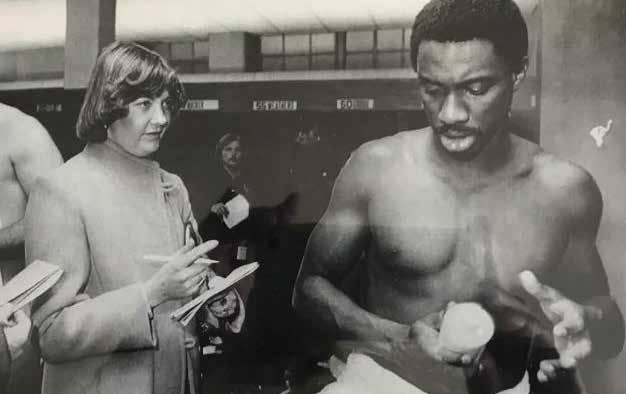
That’s why Kidd’s portrait remains untouchable on my office wall, along with his place in

34 SPECIAL EDITION
Ms. Ridenour interviews a Cleveland player in the Browns’ locker room.
At the beginning of the 2000 football season, as Coach Roy Kidd was inching closer to his 300th victory, I knew that moment would be the one photo that would define my career as Eastern’s university photographer. I could sense that it would be the one image that would still matter a hundred years from now. I just had to make sure I was there when it happened.
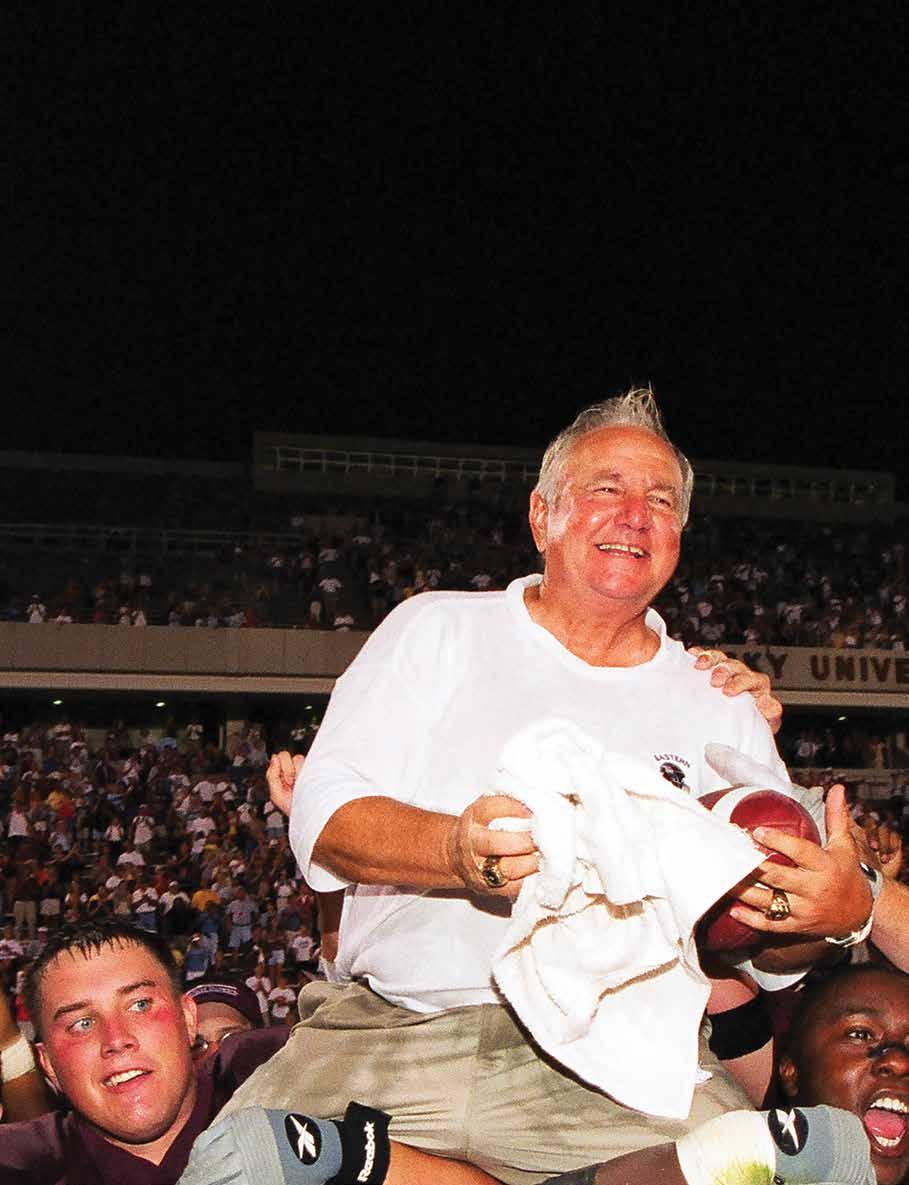
CHASING
 by Tim Webb
by Tim Webb
EKU MAGAZINE 35
3
Leading up to 300, I did several photos with Coach because I knew the university and media outlets would be in need of images. One of my all-time favorites came from a portrait shoot with Coach and the four consecutive trophies that came from Eastern’s four consecutive national championship appearances 1979-82. We were casually talking about his time as quarterback at Corbin High School and Eastern, when, out of the blue, he picked up a football and donned a left-handed quarterback pose with a big smile on his face. For a coach so meticulous in his planning, it was such an impromptu moment.

During my time as a student at Eastern, players like Lorenzo Fields, Elroy Harris and Tim Lester were lighting up the record books. Counting my days as photo editor of The Eastern Progress, I covered Coach Kidd and the Colonels starting in 1991. That year, I photographed the Colonels’ playoff run, which included a 14-3 win over Appalachian State on a rainy, muddy Thanksgiving weekend in Richmond, followed by a heartbreaking 14-7 loss in the semifinals to Marshall in Huntington.
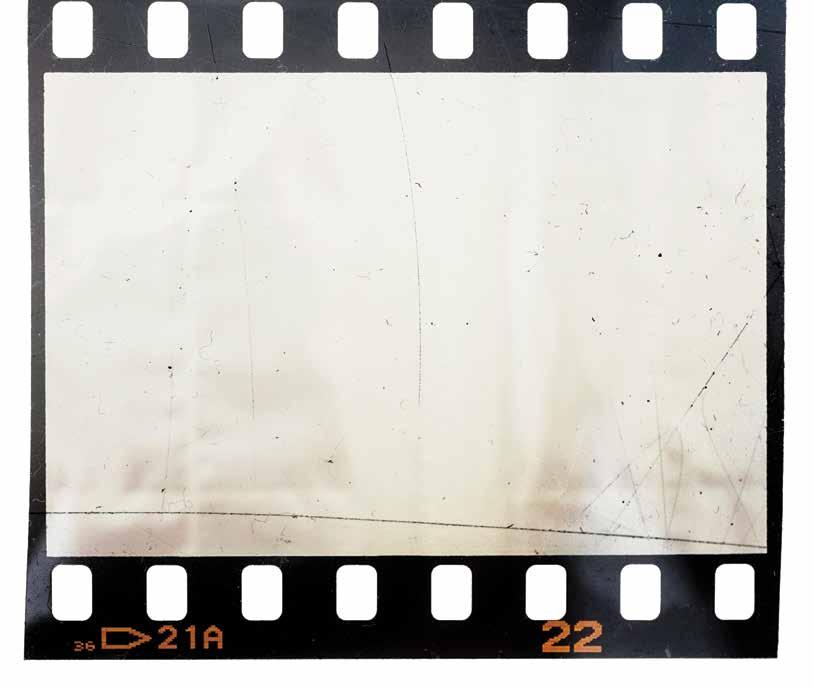
With the 2000 season drawing to a close and Coach sitting on 299, I made the long trip to Charleston, Illinois, as the Colonels took on Eastern Illinois and future NFL quarterback and broadcaster Tony Romo. Eastern’s season came to an end that Saturday afternoon and, with it, the quest for 300 would have to wait another year. As I drove back to Richmond, I couldn’t help but think that, surely, they would schedule a home game to open up the 2001 season so that Coach could get his milestone win at home.
Nope. Chasing 300 wouldn’t be that easy. For me, the 2001 season kicked off with an even longer drive to Mount Pleasant, Michigan, to photograph the Colonels against the Division I Chippewas of Central Michigan University. While the Colonels took a lead into halftime, we left Mount Pleasant still one win short.
I knew that Coach’s chances would improve the following Saturday, when we were set to host Liberty University in the stadium that bore his name. As expected, on a beautiful Saturday evening, September 8, 2001, the Colonels whipped
36 SPECIAL EDITION
Liberty 30-7 to give Coach Roy Kidd his 300th career victory, solidifying his place among the greatest college football coaches in the history of the game. As the sun fell and with the clock winding down, his players doused him with Gatorade, hoisted him on their shoulders and carried him out onto the field.
For a few seconds, I froze and didn’t know what to do because the clock was still running with about 30 seconds, and the game was still in progress. I thought, “You can’t do that. You can’t do that. The game is still going on!” All I could think about was how I had driven so many miles and spent so many hours chasing 300. And now, here it was unfolding in my back yard, and I was about to miss it because I didn’t want to be a rule breaker.
Not to be denied, I ran out onto the field and cut into the middle of the huddle as it was still moving. I popped up in front of Coach Kidd and was able to fire off two frames before stumbling backward. I couldn’t be sure I got the “money shot” until the following Monday morning, when I picked up the film from a local lab. My heart sank when I looked at the first frame because one of the players who was holding coach’s leg was looking directly at me with his tongue stuck out. Thankfully, by the second frame, he had looked away and put his tongue back in his mouth — that was the image that will go down in EKU history.
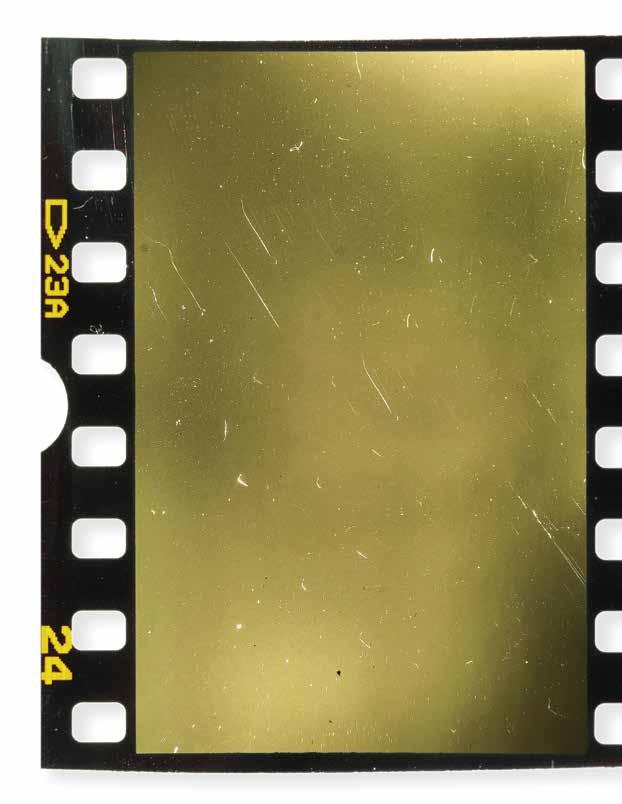
The celebration on the field that night was unlike anything I had ever experienced. You could tell there was a sense of relief with Coach Kidd because a weight had been resting on his shoulders for several months. You could see the sense of accomplishment on his face, along with a big smile, as he and Sue embraced on the field. It was as if everything they had worked for all those years culminated that night. And while Coach was celebrating with his family, the students were busy tearing down the goal posts. It warmed my heart to watch as they carried one of posts off of the field like an army of
Colonel fans climb a home-field goal post to celebrate Coach Kidd’s historic 300th victory.

ants and down Kit Carson Drive to its final resting place at Madison Garden downtown.
It dawned on me that night as I was packing up my gear to go home that Coach Kidd was never meant to win number 300 on the road. The opposing fans wouldn’t have appreciated it the way we did. It was only fitting that number 300 was won at Roy Kidd Stadium in Richmond, making that rendition of “Cabin on the Hill” extra special.
Chasing 300 and having the opportunity to record part of Coach Roy Kidd’s legacy was an experience I’ll
IT WAS ONLY FITTING THAT NUMBER 3OO WAS WON AT ROY KIDD STADIUM IN RICHMOND, MAKING THAT RENDITION OF “CABIN ON THE HILL” EXTRA SPECIAL.
by Dr. Charles Douglas Whitlock (EKU President Emeritus)
I first met Roy Kidd in the fall semester of 1957. He was my freshman general science teacher at Madison High School in Richmond. He was in his second year as the football coach of the Madison-Model Royal Purples, which built into a dynasty of sorts. A decade later, he would be well on his way to the same sort of success at EKU.

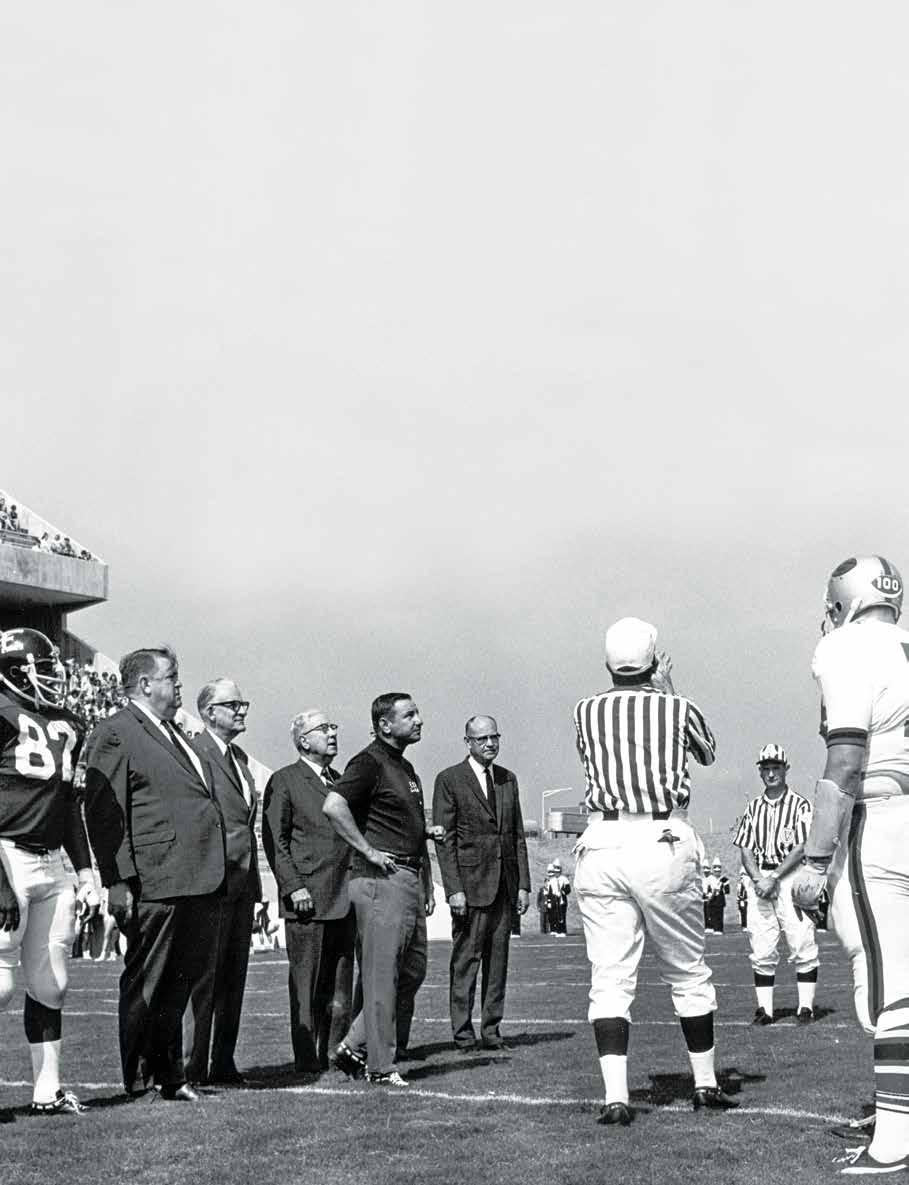
38 SPECIAL EDITION
Randall Fields, editor of the Richmond Daily Register, was looking for someone to cover Madison-Model athletics and asked my English teacher for recommendations. That’s what got me into sports reporting. Eventually, I was also stringing for newspapers in Louisville and Lexington.
In a story I did for the Lexington Herald in advance of a big Central Kentucky Conference game, I wrote something to this effect: “Two of the Royal Purple trademarks are a stunting defense and counter trap running plays.” After this appeared in the morning paper, Coach Kidd sought me out in study hall. His words, still etched in my memory, were, “Doug, I did not appreciate that scouting report in the newspaper, and if we lose, your butt is mine.” He may not have said “butt.”
I graduated from high school in 1961, and it was the last combined Madison-Model graduating class. It seems that other schools in Central Kentucky had complained that it was unfair for two schools to combine their student bodies for athletic teams. Considering there were only 57 seniors in my class, these other schools were chafing from being outcoached.
Incidentally, Jack Ison and Bobby Harville, who later joined Coach Kidd at Eastern, were on his MadisonModel staff.
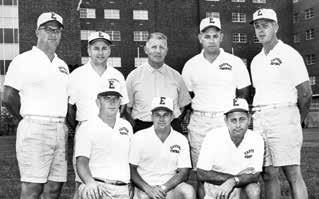

Coach Kidd and I were reunited in 1963 when he came to Eastern as an assistant on Coach Glenn Presnell’s
staff. He had left Richmond in 1962 and spent a year as an assistant coach at Morehead State. A year later, in 1964, he was named head coach and what would become “A Matter of Pride” was begun.

Our relationship was very much like it was in high school. I was a student assistant in Vice President Donald Feltner’s Office of Public Affairs, and under his tutelage I was doing sports information work and once again covering a Roy Kiddcoached team, both home and away. It was during the 1964 and 1965 seasons that my appreciation for him as a coach and person really grew. I have never been around anyone with higher expectations for himself and those around him. And these high expectations were not limited to the football field. He demanded politeness and courtesy. On more than one occasion, I heard him tell players –– often stars –– to take off a cap or hat indoors.
During our long careers at EKU, Roy and I had a lot of contact and became good friends. He retired one year before my first retirement in 2003. In 2007, when I came out of retirement to become president, he was working part time in development, helping our fundraising efforts. It did my heart good to see so many of his former players show their respect and love for the man at alumni meetings around the country. No one embodies what I call the Essential Eastern more than

EKU MAGAZINE 39
Roy Kidd. He loves EKU, and his legacy is one that will endure at this very special place. n
PREVIOUS PAGE: The opening game at the New Hanger Field in 1969 against Austin Peay, with, from left, Sidney Yeldell, EKU President Dr. Robert Martin, Regent Robert Begley, Regent William Wallace, Coach Kidd and Faculty Regent Ralph Whalin. ABOVE LEFT: Coach Kidd with Eastern student Doug Whitlock. TOP RIGHT: Coach Kidd with President Martin. ABOVE: the EKU coaching staff in 1963, front row, from left, Joe Blankenship, Bobby Harville, Bill Shannon; back row, Don MacDonald, Coach Kidd, Glenn Presnell, Carl Oakley and Tom Harper.
Scoreboard C2 Farm C16
Obituaries C18
L EXINGTON H ERALD-L EADER


SPORTS
Eastern romps past C
By Gene McLean Herald-Leader staff writer
Just seconds after the horn sounded, signaling the end of Eastern Kentucky’s 45-21 romp over the University of Louisville yesterday, the Colonels’ Harold Torrens reached down, grabbed Coach Roy Kidd and held him in his arms.


“Coach, we kicked their butts,” screamed Torrens, a Louisville native who played his high school football right next door to U of L. “Coach, we kicked their butts.” That was about the size of it as Eastern Kentucky, long a Division I-AA power, beat a Division I-A team for the first time. After the game, Louisville coach Howard Schnellenberger offered Kidd a brief congratulations and a brisk
Then, the wild and crazy contingent of Eastern fans beckoned
Kidd to its corner of the field for a wave and a rendition of the victory song “Cabin on the Hill.”
Kidd waved, smiled, sang, hugged and cried.
“This is wonderful,” he said.
“This was a big win for our team and our program.”
It was a big victory for another reason. Eastern’s overwhelming performance coupled with Murray State’s shocking loss to Western Kentucky throws open the possibility that the Colonels may just make the I-AA playoffs for the seventh straight season. That seemed farfetched just a couple days ago.
Eastern, which has won five of its last six games, is now 8-3. The playoff decision just may come down to a choice between the Colonels, who were unranked last week, and 8-3 Akron, which was ranked No. 13 among Division
I-AA schools last week. Eastern beat Akron in the season opener 16-6 and was angered by last week’s poll.
An NCAA committee is expected to complete the 12-team field today. Six spots are already tied up by conference champs, and two spots are guaranteed to independents. That leaves Eastern hoping for one of the last four spots.
“Before the game, I really didn’t think we had a chance at the playoffs,” Kidd said. “It just seems that the guys voting didn’t want us in for some reason. I mean, we didn’t even get ranked last week. So I told the kids that we’ll just make this game our playoffs. I already have plans to take off on Monday.
“But I think it’ll be a shame if we don’t make it now. We are peaking at just the right time. Our team is just now starting to get it together. I saw it coming when we lost to
Murray. After today, I know we’re one of the top 12 teams in the country. You know, I can always change my plans for Monday.”
Yesterday, though, was for celebration. Even if Eastern doesn’t make it to the playoffs, the Colonels proved their ability with their best performance since 1982 when they went 13-0 and won the Division I-AA national championship.
“Coach, you guys embarrassed us,” muttered Louisville’s Eric Givens to Kidd as he walked off the field.
This was a game that Schnellenberger thought his team could win. U of L president Donald Swain said on TV the Cards would win.
No wonder the optimism ran high for this 2-8 team. They were playing a I-AA team, which means 30 fewer scholarships, 95-65.
Herald-Leader/Steven R. Nickerson
A look at University of Louisville coach Howard Schnellenberger, above, told the story: His Cardinals lost 45-21 to Eastern Kentucky yesterday. EKU tailback Elroy Harris, right, flipped after scoring a touchdown.
ards 45-21 Section C
But it was no contest. Not in the beginning. Especially not in the end.
Just consider:
• Eastern ran out to a 21-0 lead early in the second quarter, led 28-7 at the half and built the lead to 42-7 by the end of the third quarter.
• The Colonels racked up 555 yards of total offense.
Quarterback Mike Whitaker completed nine of 10 passes for 205 yards and two touchdowns, while tailbacks James Crawford and Elroy Harris were their usual sensational selves. “Mike played great,” said EKU offensive coordinator Leon Hart. “And James and Elroy did it –– again.”
Crawford had 167 yards, and that boosted his season total to 1,282 yards. Harris had 150 yards and three TDs, giving him 1,134 yards and 14 touchdowns for the year. They are the first tandem in the OVC, just the third in the history of I-AA, and only the 17th in the history of the NCAA to break 1,000-yard barrier.
• Eastern could have made it worse. The Colonels who allowed two fourth-quarter TDs while playing their second- and third-string defenses had the ball at the Louisville 30-yard line and just sat on it until time ran out. “One of my assistants told me we could score if we ran Z258 (a pass play),” Kidd said. “I just told him, ‘No. If it comes, it comes, but let’s not try for it.’ I’m just not made that way. I want to win. I love to win. But I don’t like to rub people’s noses in the ground if I can help it.”
Yesterday, Eastern couldn’t help it. Early in the game, on a firstand-15 play at the EKU 36-yard line, Whitaker spun away from center, cut to his left and headed upfield on an option. When he reached midfield and just a second before he got sandwiched,
Sunday, November 24, 1985

Whitaker side-armed a lateral outside to Harris, who rolled untouched for a 64-yard touchdown.
“I saw Elroy out of the side of my eye, and I just flipped it to him,” Whitaker said. “When he got it in the open field, I knew he was gone. The key was getting up on them early. It encouraged us and they got down.

“I think a lot of us had something to prove today. We wanted to show people that we could beat a Division I team; that we’re just as good. We wanted to prove to people that we should be in the playoffs, too. If they don’t let us in, it’s probably because they’re scared of us.”
Just three plays after Eastern’s first TD, Louisville quarterback Ed Rubbert was intercepted by end Joe Mauntel, giving the Colonels the ball at the U of L 15. Eight plays later, Harris scored his second TD.
It quickly became 21-0 early in the second quarter thanks to another U of L turnover. Fullback John Adams fumbled and EKU’s Jeff Walker recovered at the Louisville 37. Four plays later, Harris had TD No. 3 a four-yard run.
“I wanted to show I could play Division I,” said Harris, who was recruited by Schnellenberger. “I think I did.”


U of L made only one semi-serious threat in the game. It cut the lead to 21-7 and then recovered a fumble on the ensuing kick at the EKU 31. But the Cards failed on a fourth-and-one play at the 22.
“I think that was the turning point in the game,” Kidd said. “We didn’t let them in it, and our kids took them out of it. They just retaliated. It was fun.”
The Colonels scored touchdowns with just six seconds left in the first half and on their first two possessions of the second half to turn it into a 42-7 blowout.
EKU MAGAZINE 41
Top: Defensive tackle Aaron Jones sheds a block on his way to the U of L backfield. Above: Showing concentration, Head Coach Roy Kidd looks at the scoreboard.
LEXINGTON HERALD-LEADER
Eastern wins 26-21 on miracle final play SPORTS
By Rick Bailey
Herald-Leader staff writer
RICHMOND –– “My first thought was pure joy,” said Eastern Kentucky’s Sean Little after scoring the winning touchdown.
The first thought for everybody else in the place was pure shock.
In a finish for the ages, Eastern Kentucky edged NE Louisiana 2621 here last night.
On the game’s final play, with the ball at the NE Louisiana 39, Indians center Chandler Tatum snapped the ball over the head of punter Chad McCarty. The ball rolled down the field with McCarty and 11 Colonels in hot pursuit. McCarty reached the ball just short of the goal line.
“(McCarty) dove on it,” Little said. “It popped out, and I got it.”
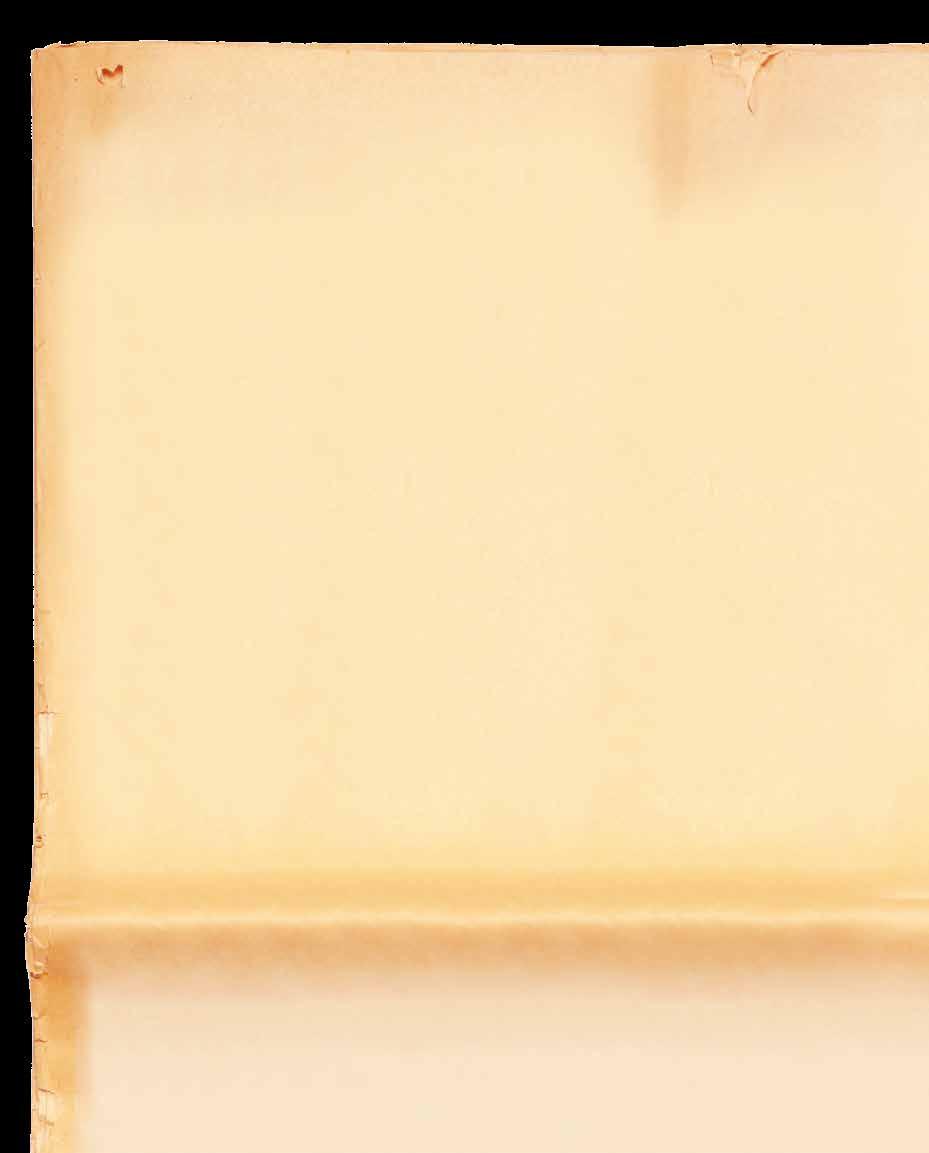
“It was going into the end zone pretty quick,” McCarty said. “I knocked it into their legs. Their force knocked it into the end zone,
and they recovered it.”
“The (players) wanted to run the clock out,” NE Louisiana Coach Dave Roberts said. But he chose to punt the ball. “All we gotta do get the foot on the ball and it’s over,” he said. “We got what we deserved.”
What the estimated 17,200 fans got were six lead changes and an incredible finish to a taut game between two Division I-AA powers.
“I was so excited because I knew we had won,” Little said. “My one thought was, ‘It’s celebration time.’”
“Please don’t ask me (about the play),” Tatum told Jeff Duncan, a reporter from the Monroe (La.) News-Star.
Earlier, it appeared that three Colonel turnovers in the fourth quarter would send EKU to “its” first loss in a home opener since 1962.
In fact, Mike Penman’s second fumble of the quarter gave the

Indians possession at midfield with 2:18 left.
But NE Louisiana was unable to run out the clock. Facing fouth-and-11 from their 49, the Indians let the clock run down to six seconds before taking a delayof-game penalty. Then, they were charged with illegal procedure. That took the ball back to the 39. Then, they lost the game.
The game’s not over till it’s over,” Eastern Coach Roy Kidd said. “When I saw the ball go over his head, I said, ‘We’ve got a chance.’ I thought we could recover it before time ran out and kick a field goal.”
The start of the game was just as explosive as the finish ––beginning with the opening kickoff, which Easterm’s Leon Brown returned 98 yards for a touchdown. It took him 16 seconds to start to the right, then angle across the field to outrace the Indians to the goal line.

Brown had a 100-yard kickoff return to open the second half in Eastern’s 21-7 victory over Western Kentucky two weeks ago.
But Northeast Louisiana countered with a 69-yard scoring march that took almost six minutes.
Ches Liles, making his first start at quarterback in the last seven games, ended the drive with an eight-yard scoring pass to Vincent Brisby with 9:01 left in the first quarter.
But Eastern’s Brad Ladd roared through to block Rob Tallent’s extra-point kick.
After recovering an EKU fumble, the Indians went on another time-consuming drive climaxed by a four-yard Liles-toBrisby pass on fouth down.
But Ladd broke up the twopoint conversion pass.
The teams exchanged punts until Eastern took a 14-12 lead with 12:04 left in the second quarter.
All-American Markus Thomas took off around the right side. Seemingly hemmed in, he cut across the field and raced 71 yards to paydirt.
The run elevated him to third place in Ohio Valley Conference career rushing, regular-season games only.
The teams exchanged two punts before Northeast Louisiana took a 15-14 lead 12 seconds before the break on Tallents 35yard field goal.
Eastern went ahead 20-15 barely four minutes into the second half.
Tatum’s high snap forced McCarty to attempt a pass rather than punt on the first series.
The pass was incomplete, Eastern declined a penalty and the Colonels took over on the NE Louisiana 21.
Six running plays left Eastern with fourth down at the 3. Duffy lined up for a field goal, but holder Jason Thomas ran the ball in untouched.
Markus Thomas was stopped just short of the goal line on the two-point attempt. He suffered a mild concussion and handled the ball only two more times.
“I felt like I was hit with a sledgehammer,” Thomas said. “I was feeling woozy, and I was afraid I might drop the ball.”
Northeast Lousiana regained the lead at 21-20 following a Joey Crenshaw interception. Robinson ran for nine and 26 yards, then scored from the 1 with 8:14 to play. Brisby couldn’t handle the conversion pass for two points.
Eastern then drove to the enemy 16, thanks in part to a 35-yard romp by Crenshaw, but Penman fumbled away the ball.
Penman also fumbled on the first paly of Eastern’s next possession. But Northeast Louisiana failed to run out the clock, and fate intervened.
EKU’s Todd Duffy (35) cheered Markus Thomas, who sprinted 71 yards for the score in the second quarter.
C2
Miracle in Richmond Little-used cornerback keys win
By Scott Rohrer Assistant sports editor

Northeast Louisiana was one play away from giving Eastern its first loss in a home opener in 30 years.
Facing a fourth-and-21 at their own 39 and the clock stopped with just six seconds left, NE Louisiana Coach Dave Roberts made a decision to send the punting unit onto the field.
When Indian center Chandler Tatum snapped the ball over punter Chad McCarty’s head, 11 Colonels made a mad dash for the
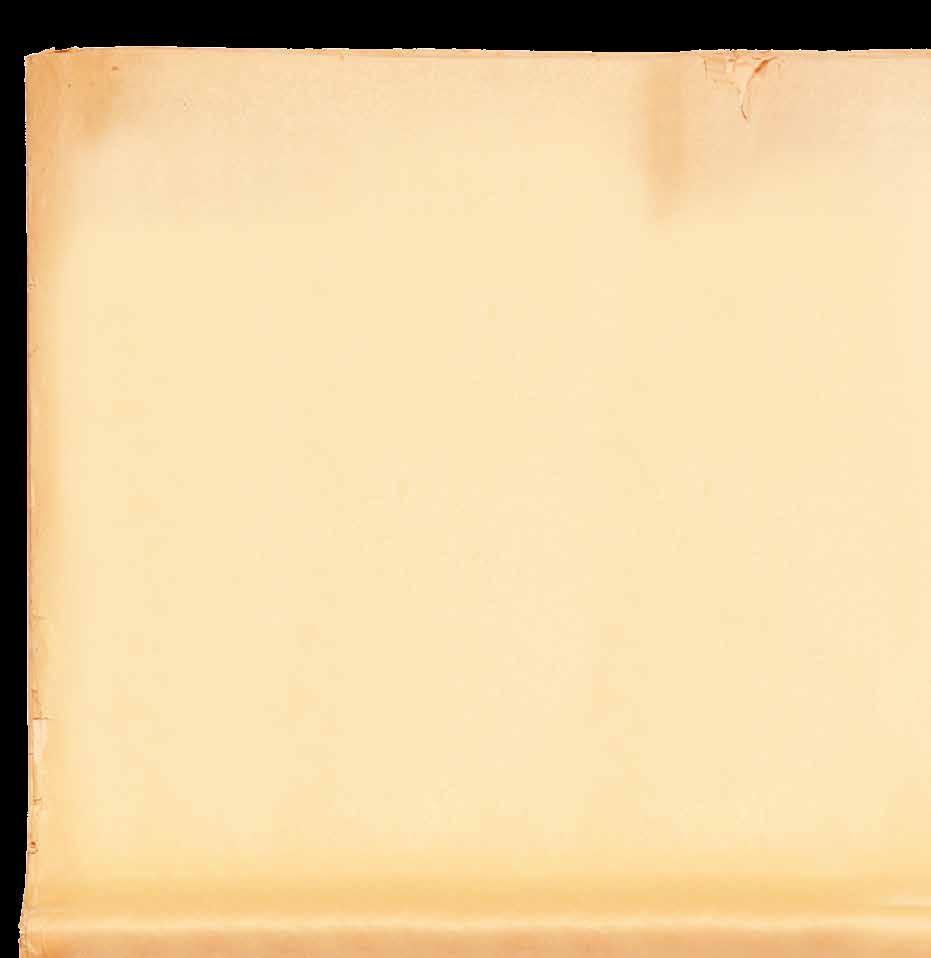



ball and victory. McCarty reached the ball first and dove on it just short of the goal line. But as Brad Ladd pounced on him, it popped out and Sean Little picked up the ball in the end zone.
Touchdown. Game over.
Eastern 26, Northeast Louisiana 21.
“My first thought was pure joy,” Little said. “I was excited because I knew we had won. I knew it was celebration time.”
After Mike Penman’s second fourth-quarter fumble gave the ball back to the Indians at
Colonels, with only one timeout left, appeared doomed. But three short running plays and three five- yard penalties later, they had one final chance.
“I was hoping they would line up and kick it,” Eastern Coach Roy Kidd said. “I was hoping to get a block. When I saw the ball go over his head, I said ‘We’ve got a chance.’ I thought we could recover it before time ran out and kick a field goal.”
The first play of the game was as exciting as the last. Leon Brown returned the opening kickoff 98

After the 17,200 fans calmed down, Ches Liles marched his team into the end zone on their next two possessions. Ladd blocked the first extra point and knocked down a pass on the second, as the Indians took a 12-7 lead.
The Colonels went back on top with 12:53 left in the first half when Markus Thomas broke loose for a 71-yard touchdown run, giving Eastern a 14-12 lead. Thomas had 148 of his 166 yards in the first half when he became Eastern’s all-time leading rusher in regular season games.
RobTallent nailed a 35-yard field goal late in the first half to give the Indians a 15-14 lead.
Eastern scored first in the third quarter on a fake field goal, as holder Jason Thomas streaked into the end zone, untouched from three yards out. The Indains regained the lead on a one-yard run by Greg Robinson with just over eight minutes left in the game.
“It’s hard to believe we pulled it out,” Kidd said. “Our kids played great, especially on defense. I was thinking what a shame it was to lose a game like this.”
EKU MAGAZINE 43
Section C
Progress photos by BOBBI JO SHIELDS
Eastern’s Brad Ladd (4) knocks the ball free from Northeast Louisiana punter Chad McCarty, just before Sean Little (19) picks it up for the winning touchdown.
THE COLONEL LINE IN THE NFL
 by Steve McClain
by Steve McClain
Coach Roy Kidd’s legacy goes beyond the college ranks. It stretches to the NFL as 36 former Colonels moved on to the pro ranks.
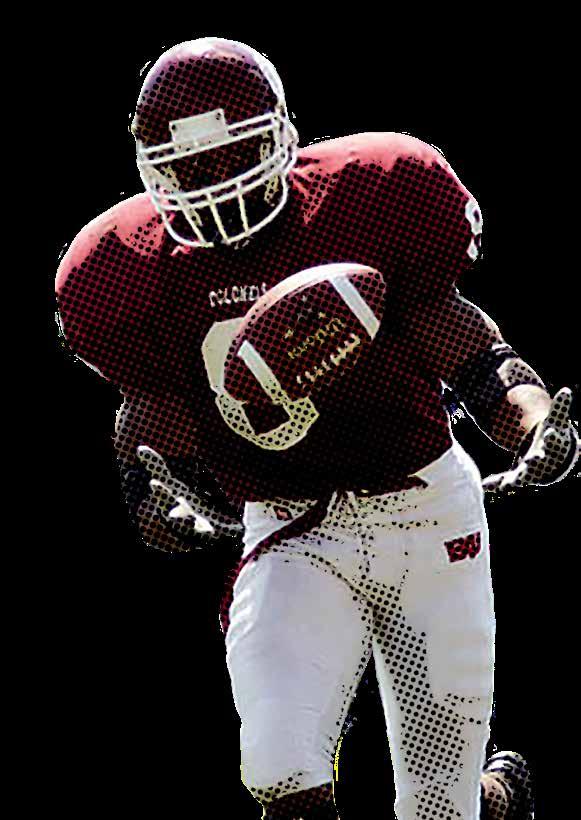
Two of those players, Jason Dunn (1992-95) and Yeremiah Bell (1999-2002), said playing for Kidd and EKU prepared them for successful pro careers.
Bell, from Winchester, walked on with the Colonels after sitting out a couple years working in a steel mill. It was not the usual journey to the NFL and “enjoying the retired life,” as Bell says he is now.
“I was forever grateful for the opportunity and accepting me as a walk-on,” Bell said. “My mentality was to not let him down. I couldn’t ask for anything more.”
The safety readily admits he was a raw talent when he got to EKU. But he said one unique challenge prepared him for the NFL.
“One of the best things that would happen is that every year I had a different defensive backfield coach. Because they were so good, they would come in and then get hired,” he said. “That was the best thing for me. Every coach that came in (taught me) valuable lessons to help me succeed in the NFL.”
Bell ended up playing nine seasons with the Dolphins and one with Cardinals. He was the Dolphins’ leading tackler in 2008 with 120, and in 2009 he recorded 114 tackles and three picks and was named to the Pro Bowl.
44 SPECIAL EDITION
“I was living the dream. It was something I never thought would happen, but it is amazing when you set your mind and work hard, what you can do,” he said. “Coming to Eastern was one of the life-changing moments in my life. Without that experience and Coach Kidd, my career doesn’t happen.”
Dunn was another Kentuckian who had a standout career at Eastern and then in the NFL. The Harrodsburg native chose to go to Eastern to stay closer to home since his dad had some medical issues, and Dunn wanted to make sure he could see him play. He came to Eastern as a defensive end and outside linebacker. But that changed one spring afternoon after his second season and a medical redshirt.



“Coach Kidd said, ‘Let me talk to you,’ and while we are talking, he threw some footballs to me. It had a nice tight spiral, and I’m catching them and having a casual conversation about classes and life,” Dunn recalled. “Coach (Jim) Tanara came up and said, ‘What are you doing catching balls? You should have dropped them.’
“Soon, Coach Kidd said, ‘I’d like to move you to tight end and get some playmakers in positions.’ So I made the move my third year, and that’s how I became a tight end.”
Dunn said that was just one example of Kidd’s uncanny ability to move players around.
36 FORMER COLONELS MOVED ON TO THE PRO RANKS

EKU MAGAZINE 45 EKU MAGAZINE 45
PREVIOUS PAGE: Former Colonel and NFL standout Yeremiah Bell. ABOVE TOP: Chad Bratzke, left, and Jason Dunn, both of whom went on to long NFL careers. ABOVE: Former Colonel Wally Chambers (60) was NFL Defensive Rookie of the Year with the Chicago Bears and a five-time Pro Bowler.
“His football knowledge, seeing my ability and to move me to a new position is what made him a great coach. He wanted to utilize a guy’s talent and be able to help the team out.”
Dunn had rare speed for a player his size and was ranked as the top tight end in the nation in Mel Kiper’s draft rankings. He ended up going in the second round to the Philadelphia Eagles, where he played for three years before heading to Kansas City for eight years. And it didn’t take long to see how EKU had prepared him for the NFL.


“Eastern taught us how to work hard, be hungry, passionate and confident, and above all be competitive,” he said. “(Kidd) nurtured an environment all the time that competition is good and pushed us to be better.
“He said if you could lift 300 pounds 10 times, you could do it 12. He credited the little weight room called The Dungeon –– nothing like what Colonel players have now,
he said –– for honing his mind and mental state.

“You are always measuring yourself against other players, and you would see guys from Michigan or Florida State, guys with hype, that may have had bigger weight rooms and nicer facilities but didn’t have what the Colonels had.
“They pushed us to be the best, and that is a credit to Coach Jack Ison and the other coaches. There was no quit, no give ever.
“The team embodies the culture of their head coach, and Coach Kidd did a great a job of that,” Dunn continued. “When I would get in the weight room against players from bigger schools, I knew that was my chance to outshine them. Thank God for the coaches and the staff for their leadership.
“I have a lot of respect for Coach Kidd. He is good-natured and good-hearted, but very measured, thoughtful, stern and caring. It had to take Coach Kidd to convince me Eastern was the right place for me. When I sat down with him, and he is wearing his championship rings, you see we win here at Eastern. We win championships. That is what sold me.” n
46 SPECIAL EDITION
ABOVE LEFT: Tim Lester (34) went on to play eight years in the NFL.
ABOVE RIGHT: Myron Guyton (29) enjoyed seven years with the Giants and Patriots of the NFL.
DUNN HAD RARE SPEED FOR A PLAYER HIS SIZE AND WAS RANKED AS THE TOP TIGHT END IN THE NATION IN MEL KIPER’S DRAFT RANKINGS.
Father Friend Faithful
by Jerry Wallace

A PREACHER, AN ACADEMICIAN AND A HALL OF FAME COACH WALK INTO A FOOTBALL STADIUM.
FOR DECADES, IT WAS A COMMON SIGHT ON FALL SATURDAYS TO SEE REV. BILL FORT, DR. JANNA VICE AND COACH ROY KIDD AT THE GRIDIRON. BUT THE BONDS OF FRIENDSHIP FORT AND VICE SHARE WITH THE LEGENDARY COACH ARE ANYTHING BUT COMMON. VICE AND FORT ARE NOT ONLY TWO OF KIDD’S DEAREST FRIENDS AND CLOSEST CONFIDANTS. THEY ARE TWO OF HIS BIGGEST ADMIRERS.
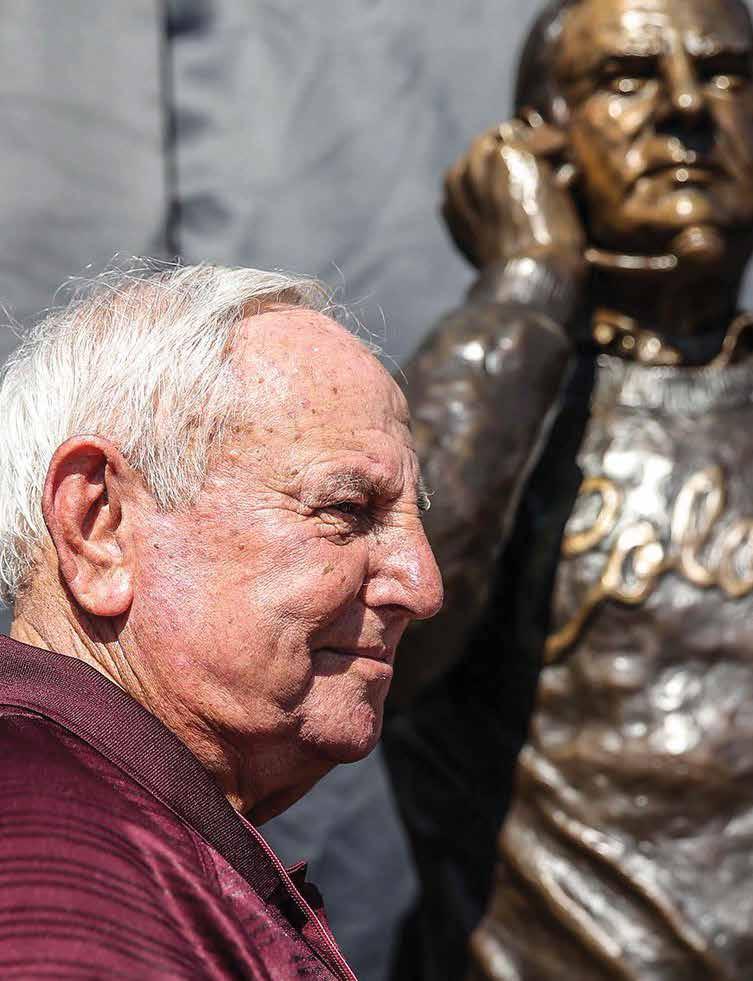
EKU MAGAZINE 47
Fort, who was Coach’s pastor at First Baptist Church of Richmond for 22-plus years, even committed the grave sin of graduating from the Colonels’ biggest rival during the Kidd era –– Western Kentucky University. After Kidd retired from Eastern, he conspired with Fort’s wife, Patience, to send his pastor a memorable Christmas gift –– a photo plaque of his final Colonel squad with the caption, “I can’t believe my favorite pastor is a Hilltopper.”
There were also tears. When Jimmy Feix, the long-time Western coach, died, Coach “grieved deeply,” Fort recalled. “He and Coach Feix had competed against each other as coaches, but they had been quarterbacks and played against each other. They loved each other and had an abiding friendship.”

Through the years, Fort came to admire Kidd’s kindness –– to everyone. “You would never know his credentials if you didn’t know him. He is so self-deprecating and never takes himself too seriously.”
Fort experienced that generosity of spirit when he was involved in a car accident and required a brief hospitalization. “At the time, Coach was in Florida. When I settled in my hospital room from the ER, my phone rang. It was Coach Kidd. He had heard and wanted to make sure I was OK. He continued to check on me until he was convinced that I was going to be fine. He didn’t depend on other people to tell him. He wanted to check himself.”
Fort also admired Kidd’s unwavering loyalty ––to his friends, his players and colleagues, his university and his family.
Another of Fort’s fondest memories revolves around the Eastern-Western rivalry. Kidd invited his pastor to lead the team in a devotional before one game and stand on the sidelines during the game. “Western won pretty handily, and as we were walking back to the locker room after the game, I was keeping my distance so he could have a moment to process his thoughts before speaking to the team in the locker room.
“He looked at me as we were walking and motioned me over to him. When I got to him, he said with a grin, ‘Be honest, you prayed for Western to win.’ He and I then broke into riotous laughter. I’m sure people watching from the stands thought it incredibly strange that Coach would be laughing after a loss. That is Coach’s humor that often surprises people. He is a fierce competitor, but he has a beautiful human side that never misses an opportunity to laugh or celebrate.”
“You can always tell the impact of a coach by the way his former players speak of him,” Fort noted. “I’ve spoken to many of his former players privately, and I always hear them speak of his impact on their lives. Even those who speak of his discipline always speak of how he had their future in mind. And he never forgets a former player. He always knows what they’re doing. When his former players have died, he has deeply grieved their passing.”
“HE ALWAYS TOLD HIS PLAYERS THIS WAS ABOUT MORE THAN FOOTBALL,” FORT RECALLED. “THIS WAS ABOUT LIFE AND BEING HUSBANDS AND FATHERS TO SEE BEYOND THE PRESENT.”
Annually, Kidd invited Fort to address the Colonel freshmen and transfers about the importance of honesty and integrity. “He always told his players this was about more than football,” Fort recalled. “This was about life and being husbands and fathers to see beyond the present.”
Certainly, Kidd never failed to credit his wife, Sue, and their three children. “He always spoke of Sue and his kids in

48 SPECIAL EDITION
PREVIOUS PAGE: Coach Kidd at the ceremony unveiling a statue outside Roy Kidd Stadium that honors his contributions. ABOVE: Coach Kidd with Rev. Bill Fort, his pastor for many years. FOLLOWING PAGE: Coach Kidd with longtime EKU professor and administrator Dr. Janna Vice.
reverential terms,” Fort said. “He never spoke of his success without including them as an integral part of his journey.”



Ever the minister, Fort repeated some life advice he heard years ago: “People in our culture have believed a lie. We have been told that the worst thing that can happen to us is failure. That’s not true. The worst thing that can happen to us is to succeed at something that didn’t matter. Coach succeeded at something that mattered,” Fort declared. “He molded and shaped numerous young men into men.”
He even helped shape the career and life of Vice, who joined her alma mater’s faculty in 1976. It’s easy for Vice to remember that Kidd’s Colonels won I-AA national titles in 1979 and 1982. Those were also the years she and her husband, Wayne, welcomed their own two children into the world.

“As football fans with a young family, Wayne and I were faithful to the Colonels,” Vice recalled. “Growing up, our children didn’t know the meaning or feeling of losing a home game. Fans learned never to leave a game until the last buzzer.”
Then Vice came to know Kidd on a different, more personal level when he became part-time athletics director and met with the University Athletics Committee, of which Vice was a member. One day, the discussion was about a trend toward nonscholarship football at some schools.
“A member of the committee made a comment, ‘We need to stay competitive in the OVC.’” Kidd’s emphatic response still rings in Vice’s memory: “Staying competitive will get you beat! Play to win or get off the field!”
“That day, and in days and years to come, I came to know Roy Kidd as not only a football coach, but as a person who believed in giving his very best at whatever he tried. Competitive?
Absolutely! But as a coach, he was also a visionary, loyal to EKU, compassionate about his team and devoted to Sue and his family.”
Kidd’s untiring drive for excellence inspired Vice as a young faculty member and throughout a 41-year tenure classroom and administrative career that culminated in her serving as provost. With the coach’s permission, Vice often employed his “play to win” comment to inspire her students. “Why would we all not aspire to do our best? Why not give that extra effort to be extraordinary?”
Vice witnessed first-hand that “A Matter of Pride” (a slogan she said “came from the heart” of Kidd) went well beyond the win-loss ledger. “He understood, perhaps better than many of us, that his job reflected on the alma mater that he loved. When he won, EKU won! His players learned the importance of giving their best on the field, and he expected them to give their best in the classroom and in life.”
They also saw, in Coach and Sue Kidd, an “exemplary happy home life. Roy and Sue’s faith, their devotion to each other, to their children and to their community has always been evident to everyone who knows them well.”
From the 1990s until Kidd’s retirement in 2002, the Vice family hosted an annual fall picnic at their country home for the coaching staff and players. Through that experience, it became obvious that “the Kidds knew and cared about their players. I enjoyed seeing their off-the-field relationships. Players clearly had an appropriate and healthy respect for Coach, and they loved Sue Kidd. She showered them with her mothering nature, and the team knew they had two coaches –– Coach Roy and Coach Sue.”
The Kidd legacy, Vice said, will resonate for generations to come, and Roy and Sue Kidd’s contributions to the lives they have touched are immeasurable. “Wayne and I are honored to call them friends. They have given both us, as well as our children and grandchildren, special memories, both on and off the field, that we will always cherish.” n
EKU MAGAZINE 49
“HIS PLAYERS LEARNED THE IMPORTANCE OF GIVING THEIR BEST ON THE FIELD, AND HE EXPECTED THEM TO GIVE THEIR BEST IN THE CLASSROOM AND IN LIFE.”
–– DR. JANNA VICE
Office of Alumni Engagement
Alumni Center at Blanton House
Eastern Kentucky University
521 Lancaster Avenue
Richmond, KY 40475-3102
COACH KIDD STAT LINE
314 WINS IN 39 YEARS (1964-2002)
TWO NATIONAL CHAMPIONSHIPS (1979 AND 1982)
TWO NATIONAL RUNNERS-UP TEAMS (1980 AND 1981)
16 OHIO VALLEY CONFERENCE TITLES
17 NCAA I-AA PLAYOFF APPEARANCES
LED COLONELS TO 25 STRAIGHT WINNING SEASONS
COACHED 55 ALL-AMERICANS AT EKU
COACHED 202 FIRST TEAM ALL-OVC PLAYERS
COACHED 41 PLAYERS THAT SIGNED NFL CONTRACTS
TWO-TIME WINNER OF THE NCAA DIVISION I-AA
NATIONAL COACH OF THE YEAR
COLLEGE FOOTBALL HALL OF FAME
KENTUCKY ATHLETIC HALL OF FAME
OHIO VALLEY CONFERENCE HALL OF FAME
EKU ATHLETICS HALL OF FAME
EKU HALL OF DISTINGUISHED ALUMNI
EKU FOOTBALL STADIUM NAMED IN HIS HONOR
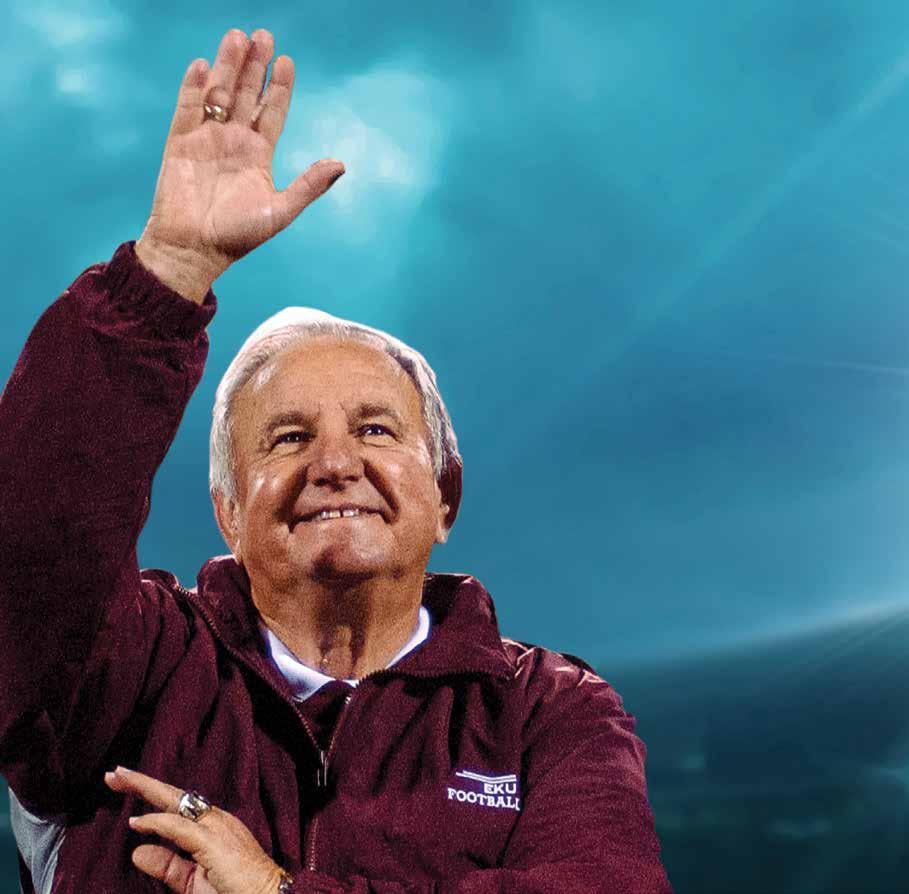
RENAMED OVC COACH OF THE YEAR AWARD TO THE ROY KIDD COACH OF THE YEAR AWARD
STREET IN FRONT OF ROY KIDD STADIUM
RENAMED ROY AND SUE KIDD WAY
STREET IN FRONT OF THE CORBIN HIGH SCHOOL
FOOTBALL STADIUM NAMED IN HIS HONOR
STATUE OF ROY KIDD AND WALL HONORING
PLAYERS, STAFF AND MANAGERS LOCATED IN THE NORTH END ZONE
EKU.EDU Nonprofit Organization U.S. POSTAGE PAID Lexington Ky Permit #879























































 by Greg Stotelmyer
by Greg Stotelmyer


 That’s my “Matter of Pride.”
Coach Kidd speaks with long-time Colonel announcer Greg Stotelmyer after his famous 300th victory.
by Karl Park
That’s my “Matter of Pride.”
Coach Kidd speaks with long-time Colonel announcer Greg Stotelmyer after his famous 300th victory.
by Karl Park






















































 by Tim Webb
by Tim Webb



























 by Steve McClain
by Steve McClain

















